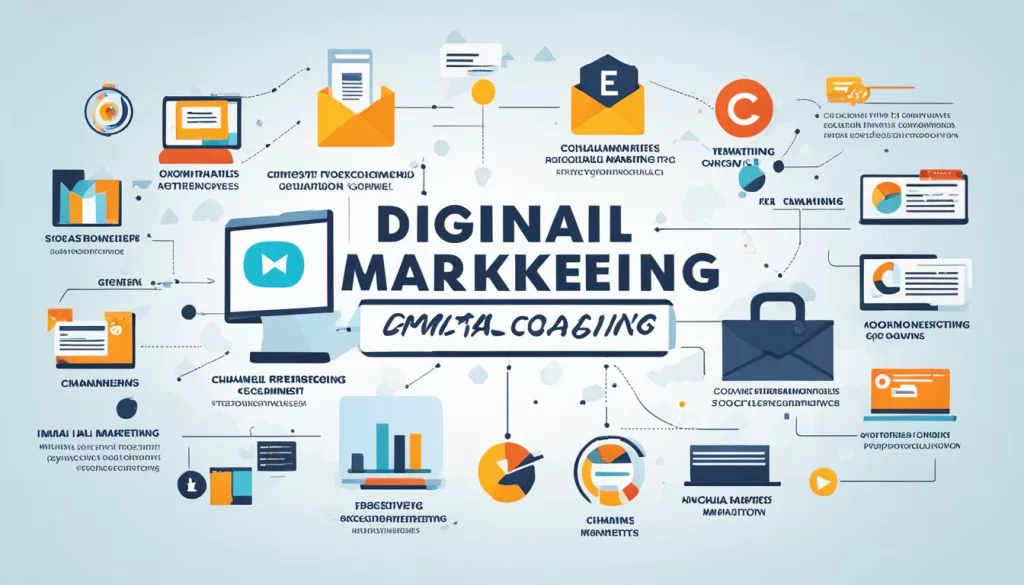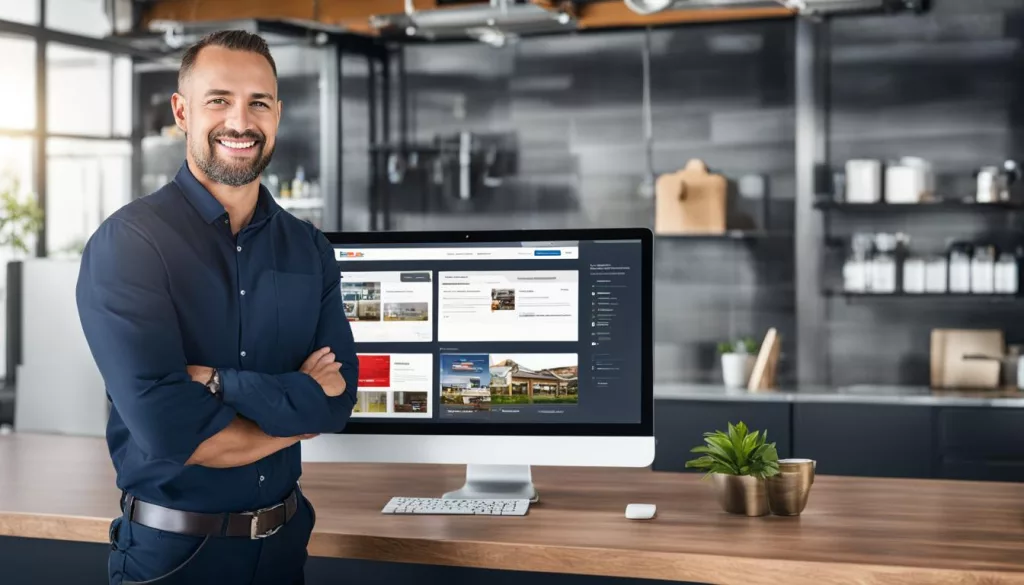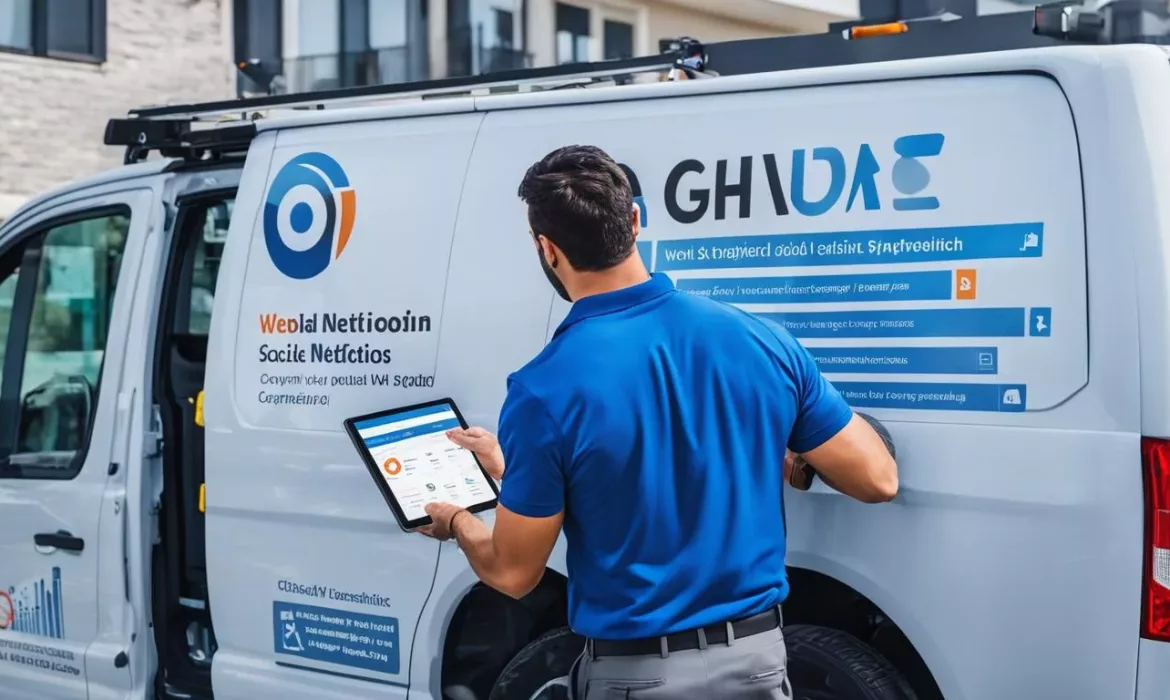10 Lead Generation Ideas for Cybersecurity Compliance Audit Specialists
Generating leads is a crucial aspect for cybersecurity compliance audit specialists. In order to grow your client base, you need effective lead generation strategies. This article will provide you with 10 proven lead generation ideas based on data from various sources.
As a cybersecurity compliance audit specialist, your expertise lies in ensuring that organizations meet and exceed compliance regulations. By understanding and adhering to regulations such as GDPR, CCPA, CPRA, SOC, HIPAA, FISMA, PCI DSS, ISO/IEC 27001, ARPA, FedRAMP, and HITRUST, you can enhance your credibility and attract potential clients who prioritize data protection and privacy.
Defining your target personas is a crucial step in generating effective leads. Identify the cybersecurity specialists and compliance audit specialists who are most likely to require your services. Consider their job roles, responsibilities, pain points, and specific needs. This will help you tailor your lead generation efforts to reach the right audience and provide relevant solutions.
Content marketing plays a vital role in lead generation. Create engaging and educational content that addresses the pain points and challenges of your target personas. Develop articles, blog posts, whitepapers, case studies, and webinars that provide valuable insights and solutions in the cybersecurity and compliance audit fields. Establish yourself as an expert and attract potential clients seeking valuable resources.
Networking and partnerships are key to generating leads in the cybersecurity and compliance audit industries. Attend industry events such as cybersecurity conferences and compliance audit associations to connect with potential clients and build relationships. Collaborate with complementary service providers and establish referral partnerships to expand your reach and generate quality leads through word-of-mouth recommendations.
Key Takeaways:
- Lead generation is crucial for cybersecurity compliance audit specialists.
- Understanding and adhering to compliance regulations enhances credibility.
- Defining your target personas helps tailor lead generation efforts.
- Engaging and educational content positions you as an expert.
- Networking and partnerships expand your reach and generate quality leads.
Understand Compliance Regulations
In the world of cybersecurity compliance audit, staying informed about regulations is crucial. Compliance with regulations such as GDPR, CCPA, CPRA, SOC, HIPAA, FISMA, PCI DSS, ISO/IEC 27001, ARPA, FedRAMP, and HITRUST is vital for the success and reputation of your business.
These regulations provide a framework for data protection and privacy, ensuring that sensitive information is securely handled and stored. By understanding and adhering to these regulations, cybersecurity compliance audit specialists can demonstrate their commitment to upholding the highest standards of data security.
Let’s take a closer look at some of the key compliance regulations that every cybersecurity compliance audit specialist should be aware of:
- GDPR (General Data Protection Regulation): This regulation was established to protect the privacy and data of individuals within the European Union (EU).
- CCPA (California Consumer Privacy Act): This regulation protects the privacy and data of California residents and grants them certain rights regarding the collection and use of their personal information.
- CPRA (California Privacy Rights Act): This is an extension of CCPA and imposes stricter regulations on how businesses handle personal information.
- SOC (System and Organization Controls): This framework provides guidelines for service organizations to manage and protect customer data.
- HIPAA (Health Insurance Portability and Accountability Act): This regulation safeguards protected health information (PHI) and ensures its confidentiality, integrity, and availability.
- FISMA (Federal Information Security Management Act): This U.S. federal law establishes requirements and standards for securing federal information systems.
- PCI DSS (Payment Card Industry Data Security Standard): This standard ensures the secure processing, transmission, and storage of credit card data.
- ISO/IEC 27001: This international standard outlines best practices for information security management systems.
- ARPA (Advanced Research Projects Agency): This agency promotes and funds research in areas of emerging technologies and cybersecurity.
- FedRAMP (Federal Risk and Authorization Management Program): This program defines security standards for cloud services used by the U.S. federal government.
- HITRUST (Health Information Trust Alliance): This framework provides guidance for managing and protecting sensitive health information.
By familiarizing yourself with these key compliance regulations, you can ensure that your cybersecurity compliance audit practices align with industry standards and legal requirements. This knowledge will not only enhance your credibility but also attract potential clients who prioritize data protection and compliance.
| Regulation | Description |
|---|---|
| GDPR | Protects privacy and data of individuals within the EU |
| CCPA | Protects privacy and data of California residents |
| CPRA | Extension of CCPA with stricter regulations |
| SOC | Framework for managing and protecting customer data |
| HIPAA | Safeguards protected health information (PHI) |
| FISMA | Requirements and standards for securing federal information systems |
| PCI DSS | Ensures secure processing, transmission, and storage of credit card data |
| ISO/IEC 27001 | Best practices for information security management systems |
| ARPA | Promotes and funds research in emerging technologies and cybersecurity |
| FedRAMP | Defines security standards for cloud services used by the U.S. federal government |
| HITRUST | Guidance for managing and protecting sensitive health information |
Define Your Target Personas
To generate effective leads as cybersecurity compliance audit specialists, it is crucial to define your target personas. By identifying the specific cybersecurity specialists and compliance audit specialists who are most likely to require your services, you can tailor your lead generation efforts to reach the right audience and provide relevant solutions. Consider the following factors when defining your target personas:
Job Roles and Responsibilities
Understand the various job roles and responsibilities of cybersecurity specialists and compliance audit specialists in different industries. This will help you target your marketing efforts towards professionals who have decision-making authority or influence in their organizations.
Pain Points and Challenges
Identify the pain points and challenges faced by cybersecurity specialists and compliance audit specialists. This could include concerns about data breaches, regulatory compliance, or the need for comprehensive security measures. Your solutions should directly address these pain points to resonate with your target audience.
Specific Needs and Requirements
Take into account the specific needs and requirements of your target personas. For example, certain industries might have unique compliance regulations or data security concerns. Understanding these specific needs will enable you to offer tailored solutions and position yourself as an expert in their field.
“By defining your target personas, you can align your lead generation strategies with the needs and expectations of cybersecurity specialists and compliance audit specialists.”
Creating target personas allows you to personalize your marketing messages, tailor your content, and develop targeted campaigns to reach your ideal clients. Remember, the more you understand your target personas, the better you can meet their needs and convert them into valuable leads.

| Job Role | Pain Points | Specific Needs |
|---|---|---|
| Cybersecurity Specialist | Data breaches, network vulnerabilities | Robust security measures, incident response planning |
| Compliance Audit Specialist | Regulatory compliance, audit preparation | Comprehensive compliance solutions, risk assessment tools |
Create Engaging and Educational Content
Content marketing plays a critical role in lead generation for cybersecurity compliance audit specialists. By creating engaging and educational content, you can attract potential clients who are seeking valuable resources and solutions. Here are some effective strategies to develop content that resonates with your target audience:
- Identify the pain points – Understand the challenges and concerns faced by cybersecurity specialists and compliance audit specialists. This will help you create content that addresses their specific needs and offers valuable insights.
- Offer educational resources – Develop informative articles, blog posts, whitepapers, case studies, and webinars that provide in-depth knowledge about cybersecurity and compliance audit best practices. These resources should offer practical solutions and actionable tips.
- Position yourself as an expert – Share your expertise and industry knowledge through thought leadership content. This could include opinion pieces, expert interviews, and analysis of latest trends and developments in the cybersecurity and compliance audit fields.
- Utilize visuals and multimedia – Enhance the appeal of your content by incorporating visual elements such as infographics, videos, and interactive elements. This helps communicate complex ideas and engages your audience.
- Optimize for SEO – Ensure your content is optimized for search engines by incorporating relevant keywords, meta tags, and internal linking. This will improve your content’s visibility and attract organic traffic.
- Encourage engagement – Include calls-to-action in your content to encourage readers to take the desired action, such as subscribing to your newsletter, downloading a resource, or contacting your team for more information.
Remember, the goal is to provide valuable information and establish your brand as a trusted resource in the cybersecurity and compliance audit domains.
Example: Educational Content Strategy
Let’s say you’re a cybersecurity compliance audit specialist targeting small businesses. You could create a series of blog posts and whitepapers titled “Cybersecurity 101 for Small Businesses” to educate your target audience about the basic security measures they should implement.
In the blog posts, you can cover topics such as:
- The importance of data protection
- Common cybersecurity threats faced by small businesses
- Best practices for securing networks and devices
- Employee training and awareness
Each blog post can provide practical tips and actionable advice, while the whitepapers can delve deeper into specific topics and offer comprehensive guidance.

Creating high-quality educational content not only positions you as an expert but also helps build trust with potential clients. By offering valuable resources and solutions, you can attract qualified leads who are actively seeking cybersecurity and compliance audit guidance.
Build Relationships through Networking and Partnerships
Generating leads in the cybersecurity and compliance audit industries requires more than just marketing efforts. Building strong relationships through networking and partnerships is crucial for attracting potential clients and expanding your reach.
To begin, make it a priority to attend industry events such as cybersecurity conferences and compliance audit associations. These gatherings provide valuable opportunities to connect with like-minded professionals and potential clients. Engage in conversations, exchange ideas, and showcase your expertise to leave a lasting impression.
Another effective strategy is to collaborate with complementary service providers. By establishing referral partnerships, you can tap into their existing client base and vice versa. This mutually beneficial arrangement not only opens doors to new leads but also builds credibility and trust.
In addition, leverage networking platforms, both online and offline, to expand your professional circle. Join relevant industry groups and engage in discussions to establish yourself as an authority figure. Actively participate in webinars, podcasts, or panel discussions to showcase your knowledge and expertise in the field.
Remember, networking and partnerships are invaluable assets in generating quality leads. By proactively engaging with industry events, collaborating with complementary service providers, and leveraging networking platforms, you can build strong relationships and position yourself as the go-to expert in the cybersecurity and compliance audit industries.
FAQ
What are some effective lead generation ideas for cybersecurity compliance audit specialists?
Here are 10 lead generation ideas that can help boost your client base:
How important is compliance with regulations for cybersecurity compliance audit specialists?
Compliance with regulations such as GDPR, CCPA, CPRA, SOC, HIPAA, FISMA, PCI DSS, ISO/IEC 27001, ARPA, FedRAMP, and HITRUST is essential for cybersecurity compliance audit specialists. These regulations set standards for data protection and privacy and can enhance your credibility with potential clients.
Why is it important to define target personas for lead generation?
Defining your target personas helps you identify the cybersecurity specialists and compliance audit specialists who are most likely to require your services. By understanding their job roles, responsibilities, pain points, and specific needs, you can tailor your lead generation efforts to reach the right audience and provide relevant solutions.
How can content marketing contribute to lead generation for cybersecurity compliance audit specialists?
Content marketing is a powerful tool for lead generation. By creating engaging and educational content that addresses the pain points and challenges of your target personas, you can position yourself as an expert and attract potential clients. This can be done through articles, blog posts, whitepapers, case studies, and webinars in the cybersecurity and compliance audit fields.
How can networking and partnerships help in generating leads for cybersecurity compliance audit specialists?
Networking and partnerships are key to generating leads in the cybersecurity and compliance audit industries. By attending industry events such as cybersecurity conferences and compliance audit associations, you can connect with potential clients and build relationships. Collaborating with complementary service providers and establishing referral partnerships can also expand your reach and generate quality leads through word-of-mouth recommendations.
How To Market Your Executive Recruitment Agency
Marketing your executive recruitment agency can be a challenge in the crowded recruitment industry. To stand out, you need to implement unique marketing strategies that set you apart from your competitors. In this guide, we will explore effective marketing tactics for executive recruitment agencies to boost visibility and attract top talent. These strategies are based on factual data from various sources and have been proven to be successful in the industry.
Key Takeaways:
- Implement unique marketing strategies to differentiate your executive recruitment agency.
- Use factual data and proven tactics to boost visibility and attract top talent.
- Explore just-in-time marketing to target companies with immediate hiring needs.
- Consider niching down to specific industries or job roles to build a strong brand.
- Create next-level content to position your agency as a thought leader in the industry.
Just-in-Time Marketing: Finding Open Positions
Just-in-time marketing is a powerful strategy for recruitment agencies to find open positions and connect with companies in need of immediate hiring. By identifying job openings as they become available, you can position your agency as a solution for companies looking to fill these roles.
One effective way to implement just-in-time marketing is by leveraging job search platforms like Indeed. By collecting the Indeed pages for your target businesses and sorting them by date, you can quickly identify new job openings. This allows you to be among the first to reach out to hiring managers and present your recruitment services.
Here’s a step-by-step process to implement just-in-time marketing:
- Identify your target businesses and their job search pages on Indeed.
- Automate the job checking process to regularly monitor updates.
- Sort the job openings by date to prioritize the most recent ones.
- Gather the contact information of the hiring managers or decision-makers.
- Craft a personalized pitch highlighting the benefits of partnering with your agency.
- Reach out to the hiring managers via email or phone, expressing your interest in assisting with their hiring needs.
This targeted approach allows you to connect with companies that have an immediate need for hiring, increasing your chances of success in filling open positions. It also showcases your agency as proactive and responsive to the evolving needs of the market.
“Just-in-time marketing enables recruitment agencies to be at the forefront of the hiring process. By identifying open positions as they arise, agencies can establish valuable connections with companies looking for prompt recruitment services.”
Implementing just-in-time marketing as part of your recruitment strategy can give your agency a competitive edge and position you as a reliable and efficient partner for companies seeking to fill open positions.
Niching Down: Building a Strong Brand
One of the key strategies for differentiating your executive recruitment agency is to narrow down your focus and establish a strong brand. Instead of trying to be a generalist agency, consider the power of niching down to specific industries or job roles. By positioning yourself as an expert in a particular area, such as IT staffing or life sciences, you can build credibility and attract clients who are looking for specialized recruitment services. This targeted approach allows you to stand out from the competition and establish yourself as a go-to agency for specific hiring needs.
When you narrow your focus, you become the go-to agency for specific hiring needs, and potential clients perceive you as an industry expert. This focused approach enables you to build trust with clients looking for specialized recruitment services, positioning your agency as the preferred choice in your niche.
By niching down, you can tailor your marketing efforts and messaging to resonate with your target audience. This allows you to speak directly to their pain points, understand their unique challenges, and provide solutions that are specific to their needs. When you are known for finding the best talent in your niche, clients are more likely to trust your expertise and seek your services.
Furthermore, niching down allows you to build a strong brand presence within your chosen industry or job role. By consistently delivering high-quality results within your niche, you can establish your agency as a trusted and reliable partner for both clients and candidates. This builds brand recognition and loyalty, making your agency the top-of-mind choice when it comes to executive recruitment.
Benefits of Niching Down:
- Increased Credibility: By specializing in a specific industry or job role, you establish yourself as an expert in your field, enhancing your credibility and trustworthiness.
- Targeted Marketing Efforts: Niching down allows you to target your marketing efforts towards a specific audience, ensuring that your messaging resonates and captures the attention of the right clients.
- Reduced Competition: When you focus on a niche, you face less competition compared to generalist agencies, giving you a better chance of securing clients and candidates in your specialized area.
- Build Strong Relationships: By working within a specific niche, you can build strong relationships with both clients and candidates, understanding their unique needs and providing tailored solutions.
In conclusion, niching down is a powerful strategy for building a strong brand presence in the executive recruitment industry. By narrowing your focus and becoming an expert in a specific industry or job role, you can differentiate your agency, attract clients looking for specialized services, and establish yourself as a trusted partner for executive recruitment.

Next-Level Content Marketing: Becoming a Thought Leader
Traditional blog posts with generic topics are no longer effective in content marketing. To truly make an impact and position your executive recruitment agency as a thought leader, you need to create next-level content that provides valuable insights and generates widespread interest.
One effective strategy is to develop in-depth guides that delve into specific aspects of executive recruitment. These guides should offer actionable tips, best practices, and expert advice to help clients and candidates navigate the recruitment process successfully. By sharing your expertise in a comprehensive manner, you establish your agency as a valuable resource and position yourself as a trusted authority in the industry.
Another strategy is to produce comprehensive industry reports that analyze key trends, challenges, and opportunities within the executive recruitment market. These reports can offer valuable insights to your target audience and display your agency’s understanding of the industry’s landscape.
Interviews with successful executives can also be a powerful tool in establishing thought leadership. Conducting interviews with industry leaders allows you to share their experiences, insights, and strategies, providing unique perspectives to your audience. These interviews can be published as articles, podcasts, or video content to cater to diverse content preferences.

In addition to these content formats, leveraging social media platforms and professional networking sites like LinkedIn can amplify the reach and impact of your content. Sharing your well-crafted content on these platforms can help attract a larger audience and drive engagement. By consistently producing high-quality content that showcases your industry knowledge and thought leadership, you can position your executive recruitment agency as a go-to resource for both clients and candidates.
Remember, effective content marketing is not just about creating valuable content but also about strategically promoting it to ensure maximum visibility. Utilize search engine optimization (SEO) techniques to optimize your content for relevant keywords and increase its discoverability. Share your content through email newsletters, industry publications, and guest blogging opportunities to expand your reach and establish your agency as a thought leader in the field of executive recruitment.
Conclusion
Effective marketing strategies are essential for executive recruitment agencies to attract top talent and promote their services in a crowded market. By implementing just-in-time marketing tactics, niching down to a specific industry or job role, leveraging next-level content marketing, and establishing a strong brand, agencies can position themselves for success.
Just-in-time marketing allows agencies to identify open positions as they become available and pitch their services to companies in immediate need of hiring. By reaching out to hiring managers directly, agencies can increase their chances of filling open positions and boosting their reputation.
Niching down to a specific industry or job role helps agencies build a strong brand and establish themselves as experts in that particular area. This allows them to stand out from the competition and attract clients who are seeking specialized recruitment services.
Next-level content marketing, such as in-depth guides, industry reports, and interviews with successful executives, positions agencies as thought leaders in the recruitment industry. By sharing valuable insights and showcasing their expertise, agencies can attract a larger audience and gain credibility as trusted authorities.
By personalizing their approach, highlighting client success stories, and utilizing professional networking platforms like LinkedIn, agencies can effectively connect with potential clients and expand their network.
With these strategies in place, executive recruitment agencies can navigate the competitive landscape, market their services effectively, and ultimately attract top talent for their clients.
FAQ
What are some effective marketing strategies for executive recruitment agencies?
Some effective marketing strategies for executive recruitment agencies include just-in-time marketing, niching down to specific industries or job roles, leveraging next-level content marketing, and establishing a strong brand.
What is just-in-time marketing and how can it be implemented?
Just-in-time marketing involves finding open positions as they become available and pitching your recruitment services to companies in need. It can be implemented by collecting Indeed pages for target businesses, sorting them by date, and reaching out to hiring managers with a targeted pitch.
How can niching down help differentiate an executive recruitment agency?
Niching down to specific industries or job roles allows an executive recruitment agency to establish itself as an expert in a particular area, build credibility, and attract clients looking for specialized recruitment services.
What is next-level content marketing and how does it benefit executive recruitment agencies?
Next-level content marketing involves creating in-depth guides, comprehensive industry reports, and interviews with successful executives to position an executive recruitment agency as a thought leader. This helps attract a larger audience and establish the agency as a trusted authority in executive recruitment.
How can I effectively market my executive recruitment agency to attract top talent?
To effectively market your executive recruitment agency and attract top talent, it is important to implement just-in-time marketing tactics, niche down to a specific industry or job role, leverage next-level content marketing, establish a strong brand, personalize your approach, prioritize client success stories, and utilize professional networking platforms like LinkedIn.
15 Best Online Advertising Ideas for Solar Power System Installation Experts
The solar industry is experiencing rapid growth, making effective online advertising crucial for solar power system installation experts. To reach a wider audience and promote your expertise in solar power advertising, you need to implement strategic digital marketing strategies tailored specifically for solar businesses. By utilizing the power of online marketing for solar power installers, you can attract high-quality leads and generate more conversions for your business.
In this article, we will explore 15 of the best online advertising ideas and solar marketing strategies that can help you boost your online presence and drive success in the solar industry. From social media advertising tips to innovative solar advertising ideas, we will provide you with actionable insights to enhance your digital marketing efforts.
Key Takeaways:
- Implement strategic digital marketing strategies specifically designed for solar businesses.
- Utilize social media advertising to reach a wider audience and generate high-quality leads.
- Collaborate with local environmental organizations to showcase your expertise through rooftop solar tours.
- Create limited-time promotions to incentivize potential customers to take action and choose your solar installation services.
- Stay updated with the latest solar advertising trends and employ innovative online marketing techniques.
Host Solar Education Seminars and Workshops
Hosting solar education seminars and workshops is an effective way to provide in-depth information about solar energy and the installation process. By inviting homeowners and businesses to a rooftop venue, you create a unique and engaging environment for attendees to learn about solar power. These seminars and workshops offer a platform to showcase your solar energy expertise and build trust with potential customers.
During the solar education seminar, you can provide in-depth information about solar energy and its benefits. You can explain the installation process, including the steps involved and the equipment used. By offering this detailed knowledge, you empower your audience to make informed decisions about solar power.
One effective approach is to include live demonstrations during the seminar. This allows attendees to see the installation process in action and gain a better understanding of how solar panels are installed on rooftops. Demonstrations can also highlight the durability and efficiency of solar panels, helping customers understand the long-term benefits of investing in solar energy.
Q&A sessions are an important component of solar education seminars and workshops. This allows attendees to ask questions specific to their concerns and circumstances. By providing answers and insights, you can address any doubts or misconceptions, ultimately building confidence and trust in your solar energy expertise.
Benefits of Hosting Solar Education Seminars and Workshops
- Engage and educate potential customers
- Offer in-depth information about solar energy
- Showcase the installation process through demonstrations
- Address specific concerns and questions through Q&A sessions
- Build trust and credibility with attendees
Hosting solar education seminars and workshops not only provides valuable information to potential customers but also positions you as a knowledgeable and reliable resource in the solar industry. By offering in-depth insights and practical demonstrations, you can help customers make informed decisions about adopting solar energy.

Collaborate with Local Environmental Organizations for Rooftop Solar Tours
Collaborating with local environmental organizations is an excellent way to showcase the benefits of rooftop solar installations. By organizing rooftop solar tours in partnership with these organizations, you can educate and engage the community on the different types of panels, their functionality, and their positive impact on reducing carbon emissions.
During these tours, visitors will have the opportunity to see solar power in action and learn from real-life examples. Expert guides will explain the features and advantages of various types of panels, highlighting how they contribute to sustainable energy production and reducing our carbon footprint.
In addition to showcasing the panels, these tours provide valuable insight into the installation process and the functionality of a rooftop solar system. Visitors can gain a deeper understanding of how solar energy is harnessed and how it can power homes and businesses.

Participating in rooftop solar tours organized by local environmental organizations allows potential customers to witness the positive impact of solar energy firsthand. They can see how panels are installed, how they generate electricity, and how they contribute to a cleaner and more sustainable future.
“Rooftop solar tours provide a unique opportunity for individuals to witness the functionality of solar panels and the positive impact they have on the environment. By showcasing various installation sites and explaining the benefits of solar energy, these tours play a vital role in promoting renewable energy adoption.”
– Jane Smith, President of Green Earth Foundation
By collaborating with local environmental organizations for rooftop solar tours, you can establish yourself as an expert in the field and build trust with potential customers. These tours offer an immersive and educational experience that can inspire individuals and businesses to make the switch to solar energy.
Types of Solar Panels
| Type | Features | Advantages |
|---|---|---|
| Monocrystalline | Uniform appearance High efficiency Premium quality |
– Ideal for limited rooftop space – Maximum energy production – Long lifespan |
| Polycrystalline | Multicolored appearance Lower cost Good efficiency |
– Cost-effective option – Suitable for larger installations – Moderate energy production |
| Thin-Film | Flexible and lightweight Lower efficiency Lowest cost |
– Versatile installation options – Suitable for uneven or irregular surfaces – Affordable choice |
Each type of panel has its own unique features and advantages. During the rooftop solar tours, visitors will have the opportunity to see these panels in action and learn more about which option may be the best fit for their specific needs.
Collaborating with local environmental organizations for rooftop solar tours is a powerful and impactful way to promote the adoption of solar energy in the community. By showcasing the functionality and benefits of solar panels, these tours can encourage individuals and businesses to embrace renewable energy and contribute to a greener future.
Offer Limited-Time Promotions for Rooftop Solar Installations
One highly effective strategy to incentivize potential customers to take action and install solar panels on their rooftops is to offer limited-time promotions. By creating time-sensitive offers, such as discounted installation rates or special financing options, you can create a sense of urgency and encourage customers to make the decision to go solar.
“Don’t miss out on our exclusive limited-time promotion! Install solar panels on your rooftop and enjoy discounted rates for a limited period. Take advantage of this offer to save on your energy bills and contribute to a sustainable future.”
These limited-time promotions can be a powerful tool to attract and engage potential customers, as they provide a clear incentive to take action immediately. By offering discounted rates, you can highlight the financial benefits of solar installations, making it an attractive investment for homeowners and businesses alike.
Additionally, providing special financing options can further encourage potential customers to make the decision to go solar. With flexible payment plans or low-interest financing, you make solar installations more accessible and affordable.
By leveraging the urgency and value of limited-time promotions, you can increase leads and conversions for your solar power system installation business. These promotions create a sense of exclusivity and encourage potential customers to act swiftly to secure the discounted rates or special financing options.
Benefits of Offering Limited-Time Promotions:
- Incentivize potential customers to take action and install solar panels
- Create a sense of urgency and encourage immediate decision-making
- Highlight the financial benefits of solar installations with discounted rates
- Make solar installations more accessible with special financing options
- Increase leads and conversions for your solar power system installation business
Take advantage of limited-time promotions to not only attract potential customers but also to encourage them to make the decision to go solar promptly. By offering discounted rates and special financing options, you provide tangible benefits that can motivate individuals and businesses to take action.
| Promotion | Description |
|---|---|
| Discounted Installation Rates | Save on upfront costs with reduced rates for installing solar panels |
| Special Financing Options | Flexible payment plans or low-interest financing to make solar installations more affordable |
| Free Maintenance Package | Ensure worry-free solar operation with a complimentary maintenance package |
Table: Example Limited-Time Promotions for Rooftop Solar Installations
Conclusion
Effective online advertising plays a vital role in the success of solar power system installation experts. By implementing these 15 best online advertising ideas, you can enhance your digital marketing strategies and reach your target audience more effectively. Hosting solar education seminars and workshops provides an engaging platform to educate potential customers about solar energy and showcase your expertise. Collaborating with local environmental organizations for rooftop solar tours allows you to demonstrate the functionality of solar panels and highlight their positive impact. Offering limited-time promotions incentivizes customers to take action and install solar panels, boosting your business and reducing carbon emissions.
Remember to tailor your advertising strategies to the specific needs and interests of potential customers. By providing valuable information, utilizing social media and video marketing, and leveraging effective online advertising techniques, you can generate high-quality leads and increase your visibility in the solar industry. Investing in digital marketing for solar experts is a smart move for sustainable growth and to position yourself as a trusted provider of solar power system installation services. With these powerful advertising ideas, you can shine bright in the competitive solar market and contribute to a greener future.
So, don’t wait! Take advantage of these solar advertising ideas and start implementing them in your online marketing campaigns today. Be proactive, connect with your audience, and seize the opportunities that digital marketing offers for solar experts. With the right strategies, you can make a difference in the solar industry while driving your business forward. Embrace the power of effective online advertising and see your solar marketing efforts soar to new heights!
FAQ
What are some online advertising ideas for solar power system installation experts?
Some online advertising ideas for solar power system installation experts include hosting solar education seminars and workshops, collaborating with local environmental organizations for rooftop solar tours, and offering limited-time promotions for rooftop solar installations.
How can hosting solar education seminars and workshops be beneficial?
Hosting solar education seminars and workshops provides an opportunity to offer in-depth information about solar energy and the installation process. It allows you to engage attendees, address their concerns through demonstrations and Q&A sessions, showcase your solar energy expertise, and build trust with potential customers.
How can collaborating with local environmental organizations for rooftop solar tours help in promoting solar power?
Collaborating with local environmental organizations to organize rooftop solar tours is a great way to showcase different types of panels, explain their functionality, and highlight their positive impact on reducing carbon emissions. By arranging guided tours of rooftop solar installations, potential customers can see solar power in action and learn from real-life examples.
How can offering limited-time promotions for rooftop solar installations benefit solar power system installation experts?
Offering limited-time promotions for rooftop solar installations can incentivize potential customers to take action and install solar panels on their rooftops. By creating time-sensitive offers such as discounted installation rates or special financing options, you can create a sense of urgency and encourage customers to make the decision to go solar, resulting in increased leads and conversions for your business.
What can effective online advertising do for solar power system installation experts?
Effective online advertising is essential for solar power system installation experts to promote their expertise and generate high-quality leads. It helps reach the target audience and boost solar marketing efforts. By implementing various online advertising ideas, such as hosting seminars and workshops, collaborating with local organizations, and offering promotions, experts can effectively reach potential customers and provide them with valuable information and incentives to choose their solar power system installation services.
How To Generate Leads for Energy-efficient Building Design Companies
Generating leads is crucial for the success of any energy-efficient building design company. To effectively generate leads, it is important to implement proven strategies and techniques. In this article, we will explore the best practices and tips for generating leads for energy-efficient building design companies.
Key Takeaways:
- Implementing effective lead generation strategies is essential for energy-efficient building design companies.
- Utilize customer referrals and testimonials to attract new leads and enhance credibility.
- Harness the power of social media marketing to engage with potential customers and showcase expertise.
- Optimize your website for lead generation by providing a user-friendly experience and relevant content.
- Consider using Google Ads for targeted advertising and increased visibility.
Utilize Customer Referrals and Testimonials
One of the most effective ways to generate leads for energy-efficient building design companies is through customer referrals and testimonials. Happy customers are more likely to refer your company to others, so it is important to tap into your existing customer base and ask for referrals. Additionally, collecting testimonials from satisfied customers and sharing them on social media and your website can greatly enhance your credibility and attract new leads.
Word of mouth marketing plays a significant role in lead generation. When customers have a positive experience with your energy-efficient building design company, they naturally become advocates for your brand. By implementing customer referral programs, you can incentivize your existing customers to recommend your services to their friends, family, and colleagues. This not only expands your reach but also builds trust and confidence in potential leads, as they are receiving a personal recommendation from someone they trust.
Testimonials are a powerful tool for showcasing the success and satisfaction of your customers. By collecting feedback from your clients and highlighting their positive experiences, you can demonstrate your expertise and the value you provide to potential leads. Sharing testimonials on your website, social media platforms, and other marketing materials instills confidence in prospects and encourages them to take the next step in their buying journey.
“Working with ABC Building Design was an incredible experience. Not only did they help us create an energy-efficient building that exceeded our expectations, but their team was also professional, responsive, and a pleasure to work with. We couldn’t be happier with the results!”
Testimonials offer an authentic and unbiased perspective on your company’s capabilities and the quality of your services. They provide social proof that your energy-efficient building design company has a track record of delivering outstanding results. When prospects see positive testimonials from satisfied customers, they are more likely to trust your brand and consider your services as a viable solution.
Benefits of Customer Referrals and Testimonials:
- Increased credibility and trust
- Expanded reach through word of mouth marketing
- Cost-effective lead generation
- Improved conversion rates
- Enhanced brand reputation
By leveraging customer referrals and testimonials, your energy-efficient building design company can attract high-quality leads and build long-term relationships with satisfied customers. Don’t underestimate the power of word of mouth marketing and the impact it can have on your lead generation efforts.
Harness the Power of Social Media Marketing
Social media platforms provide energy-efficient building design companies with a valuable opportunity to generate leads and expand their customer base. Platforms like Facebook, Instagram, and LinkedIn offer a wide reach and allow you to showcase your expertise, engage with potential customers, and build stronger relationships.
Developing a strategic and creative social media marketing strategy is essential for effective lead generation. By crafting engaging content, targeted advertisements, and interactive campaigns, you can capture the attention of your target audience and encourage them to engage with your brand.

In particular, LinkedIn stands out as a valuable platform for energy-efficient building design companies. With its professional networking features and industry-focused community, LinkedIn offers a unique opportunity to connect with decision-makers and promote your business directly to a targeted audience.
When utilizing social media marketing for lead generation, consider the following strategies:
- Regularly share informative and engaging content related to energy-efficient building design and sustainability.
- Actively participate in industry-related discussions and engage with potential customers and industry professionals.
- Use visually appealing graphics and videos to capture attention and make your content more shareable.
- Employ targeted advertising to reach a specific demographic and maximize your lead generation efforts.
By harnessing the power of social media marketing, energy-efficient building design companies can effectively engage with potential customers, showcase their expertise, and ultimately generate more leads for their business.
Optimize Your Website for Lead Generation
Your website is a powerful tool for lead generation. To effectively generate leads, it is important to optimize your website for desktop and mobile users, update it regularly with the latest products and services, implement SEO strategies, and create compelling copywriting that appeals to your target audience. A well-optimized and user-friendly website can attract and convert leads.
Website Optimization
Website optimization involves improving various aspects of your website to enhance its performance, visibility, and user experience. Here are some key areas to focus on:
- Page load speed: Optimize your website’s loading time to prevent visitors from abandoning your site due to slow loading.
- Mobile responsiveness: Ensure your website is mobile-friendly, as a significant number of users access the internet using mobile devices.
- Navigation structure: Create a clear and intuitive navigation menu to help users find the information they need quickly.
- Clear calls-to-action: Place prominent and compelling calls-to-action throughout your website to guide visitors towards taking desired actions, such as submitting a contact form or signing up for a newsletter.
SEO Strategies
Implementing SEO strategies will improve your website’s visibility in search engine results pages (SERPs), leading to increased organic traffic and potential leads. Consider the following SEO practices:
- Keyword research: Identify relevant keywords related to your energy-efficient building design company and incorporate them naturally into your website’s content.
- Meta tags: Optimize your meta title and meta description tags to accurately reflect your web pages and entice users to click through from the SERPs.
- Optimized URLs: Use descriptive and user-friendly URLs that include target keywords, making it easier for search engines and users to understand the content of each page.
- Quality content: Publish informative and valuable content that addresses the needs and pain points of your target audience. This will help establish your website as a trusted resource and attract organic traffic.
User Experience
Providing a positive user experience is essential for generating leads on your website. Here are some tips to enhance user experience:
- Intuitive design: Create a visually appealing and intuitive website design that enables users to navigate easily and find the information they are looking for.
- Clear messaging: Clearly communicate your unique value proposition and the benefits of your energy-efficient building design services to users through persuasive and compelling copywriting.
- Streamlined forms: Simplify lead capture forms by only requesting essential information. Long and complex forms can deter potential leads from submitting their details.
- Multimedia content: Incorporate engaging multimedia elements, such as videos and images, to enhance user engagement and convey information effectively.
By optimizing your website for lead generation, you can increase its effectiveness in attracting and converting potential leads. Remember to regularly analyze and refine your website’s performance to ensure ongoing success in generating leads for your energy-efficient building design company.
Harness the Power of Google Ads
Google Ads is a highly effective tool that can help energy-efficient building design companies generate leads and increase their visibility. By appearing on the first page of Google search results, you can attract potential customers who are actively searching for your products or services. With targeted advertising and cost-effective strategies, Google Ads can provide a high return on investment.

Targeted advertising is one of the key advantages of Google Ads. You can create campaigns that specifically target users who are interested in energy-efficient building design, ensuring that your ads reach the right audience. This approach helps you maximize your advertising budget by focusing on potential customers who are more likely to convert.
Another benefit of Google Ads is its cost-effectiveness. With proper management and optimization, you can achieve significant results within your advertising budget. Whether you choose to outsource the management of your Google Ads to professionals or learn how to do it yourself, implementing a well-structured and well-planned campaign can yield impressive results.
“Google Ads allows us to showcase our energy-efficient building design services to a highly targeted audience. By leveraging the power of keyword targeting and ad scheduling, we have been able to generate a steady stream of leads and increase our conversions.” – Jane Smith, CEO of EcoDesign Solutions
When running Google Ads campaigns, it is important to continuously analyze and optimize your ads for better performance. By monitoring the click-through rates, conversion rates, and other key metrics, you can make data-driven decisions to improve your campaign’s effectiveness.
Key Benefits of Google Ads:
- Targeted advertising reaches potential customers actively searching for energy-efficient building design.
- Cost-effective strategies ensure a high return on investment.
- Data-driven optimization leads to improved campaign performance.
- Ability to track performance metrics and make informed decisions.
- Flexibility in budget allocation and ad scheduling.
If you are looking to generate leads and increase your visibility as an energy-efficient building design company, harnessing the power of Google Ads is a smart investment. With targeted advertising and cost-effective strategies, you can reach your desired audience and drive conversions. Whether you decide to manage your campaigns in-house or seek professional assistance, Google Ads offers immense potential for growth and success.
Implement Email Marketing Campaigns
Email marketing is a powerful tool for nurturing leads and building strong customer relationships. By providing targeted and personalized content to your leads, you can keep them engaged and informed about your energy-efficient building design company.
One effective strategy is to offer valuable content, such as e-books or industry insights, in exchange for their contact information. This not only helps you grow your email list but also allows you to consistently reach out to potential leads with valuable information and updates.
When implementing email marketing campaigns, it’s crucial to segment your audience and tailor your content to their specific needs and interests. This targeted approach ensures that your emails resonate with your audience and provide them with valuable information.
Personalization is key in email marketing. By addressing your leads by their names and providing content that is relevant to their needs, you can create a personalized experience that builds trust and strengthens your customer relationships.
Furthermore, email automation can help streamline your email marketing campaigns. By setting up automated workflows, you can deliver timely and relevant content to your leads at various stages of the buying process. This increases the likelihood of conversion and helps move leads through the sales funnel.
In conclusion, implementing email marketing campaigns is essential for generating and nurturing leads for your energy-efficient building design company. By delivering targeted content, personalizing your emails, and utilizing automation, you can effectively engage your audience, build strong customer relationships, and drive conversions.
Conclusion
Generating leads for energy-efficient building design companies requires a strategic and comprehensive approach. By implementing a combination of lead generation strategies, such as leveraging customer referrals, harnessing the power of social media marketing, optimizing your website, utilizing Google Ads, and implementing effective email marketing campaigns, you can attract and convert leads for your business.
Customer referrals and testimonials are powerful tools for generating leads. Encourage your satisfied customers to refer your company to others, and collect testimonials to showcase your credibility and attract new leads. Additionally, harness the power of social media marketing by developing a strategic and creative strategy, with a particular focus on platforms such as Facebook, Instagram, and LinkedIn.
Your website plays a crucial role in lead generation. Optimize it for desktop and mobile users, regularly update it with the latest products and services, implement SEO strategies, and create compelling copywriting that appeals to your target audience. Consider utilizing targeted Google Ads to increase your visibility and attract potential customers actively searching for your products or services.
Finally, implement email marketing campaigns to nurture leads and build strong customer relationships. Provide targeted and valuable content to your leads, such as e-books or industry insights, and consistently evaluate and adjust your lead generation efforts to maximize your success in the energy-efficient building design industry.
FAQ
How can customer referrals and testimonials help generate leads for energy-efficient building design companies?
Customer referrals and testimonials can greatly enhance the credibility of an energy-efficient building design company. Happy customers are more likely to refer your company to others, generating new leads. Sharing customer testimonials on social media and your website can also attract new leads.
How can social media marketing be utilized to generate leads for energy-efficient building design companies?
Social media platforms, such as Facebook, Instagram, and LinkedIn, provide valuable opportunities for energy-efficient building design companies to generate leads. By developing a strategic social media marketing strategy, businesses can engage with potential customers, showcase expertise, and build strong relationships. LinkedIn, in particular, is a valuable platform for networking and promoting business to a targeted audience.
How can website optimization contribute to lead generation for energy-efficient building design companies?
Optimizing your website for both desktop and mobile users, regularly updating it with the latest products and services, implementing SEO strategies, and creating compelling copywriting that appeals to your target audience can attract and convert leads. A well-optimized and user-friendly website boosts visibility and encourages potential customers to contact your business.
How can Google Ads help generate leads for energy-efficient building design companies?
Google Ads can be a highly effective tool for generating leads. By being present on the first page of Google search results, businesses increase their visibility and attract potential customers actively searching for energy-efficient building design services. Whether managing Google Ads internally or outsourcing the task, targeted advertising and cost-effective strategies can yield a high return on investment.
Can email marketing campaigns contribute to lead generation for energy-efficient building design companies?
Yes, email marketing is a powerful tool for nurturing leads and building strong customer relationships. Providing targeted and personalized content to leads keeps them engaged and informed about an energy-efficient building design company. By offering valuable content, such as e-books or industry insights, in exchange for contact information, companies can grow their email list and consistently reach out to potential leads.
What is the importance of lead generation for energy-efficient building design companies?
Lead generation is crucial for the success of energy-efficient building design companies. By implementing proven strategies and techniques, businesses can attract and convert leads, expanding their customer base and ultimately driving their growth and success in the industry.
Best Online Advertising Ideas for Advanced Skin Rejuvenation Clinics
When it comes to advanced skincare, effective online advertising strategies are vital for cosmetic clinics to reach their target audience and promote their services effectively. Understanding the needs and preferences of the target audience is key to creating successful marketing ideas for advanced skin rejuvenation clinics. One approach that can yield positive results is cross-promotion with local businesses such as fitness centers, spas, or shops selling skincare products.
Utilizing various online advertising strategies allows clinics to target the right audience and drive engagement. This can include search engine marketing, social media advertising, and display advertising, among others. By adopting a multi-channel approach, clinics can maximize their online promotion efforts and ensure their message reaches potential clients across different platforms.
To illustrate the potential of effective online advertising, consider the case of XYZ Skin Rejuvenation Clinic. By implementing a comprehensive digital marketing strategy, including search engine optimization (SEO), targeted social media campaigns, and collaborations with influencers in the beauty industry, XYZ Clinic saw a significant increase in website traffic and, ultimately, new patient bookings.
Key Takeaways:
- Understanding the target audience’s needs is crucial for effective marketing
- Cross-promotion with local businesses can enhance online promotion efforts
- Utilize various online advertising strategies to reach the targeted audience
- Implement a comprehensive digital marketing strategy for optimal results
- Track and analyze the success of online advertising campaigns for continuous improvement
Omnichannel Marketing for Advanced Skin Rejuvenation Clinics
Omnichannel marketing is a powerful strategy for advanced skin rejuvenation clinics to engage patients, build a strong brand presence, and promote their cosmetic services effectively. By creating a seamless user experience across all channels, clinics can enhance patient engagement, reinforce their branding, and establish credibility in the competitive aesthetic clinic industry.
Implementing omnichannel marketing starts with patient journey mapping, which involves understanding the various touchpoints patients encounter throughout their interaction with the clinic. By mapping out these touchpoints, clinics can ensure a cohesive and integrated experience for their patients as they transition from one channel to another.
One of the key benefits of omnichannel marketing is the ability to build a strong and consistent brand presence. This involves establishing a distinct brand identity, creating consistent messaging, and maintaining a compelling online presence. By representing a consistent brand image across all channels, clinics can enhance visibility, attract prospective patients, and differentiate themselves from competitors.
Through omnichannel marketing, clinics can effectively utilize a variety of online channels to engage with their target audience. This can include websites, social media platforms, email marketing campaigns, online advertisements, and more. By strategically using these channels, clinics can reach patients where they are most active and capture their attention with personalized and relevant content.
Furthermore, omnichannel marketing allows clinics to deliver a personalized and tailored experience to each patient. By leveraging data and insights from different channels, clinics can segment their audience and deliver targeted messages that resonate with specific patient groups. This level of personalization fosters a deeper connection and builds loyalty among patients.
To optimize the effectiveness of omnichannel marketing, advanced skin rejuvenation clinics can implement the following strategies:
- Integrate online and offline touchpoints to provide a seamless experience for patients.
- Create consistent branding and messaging across all channels.
- Utilize data and analytics to understand patient behavior and preferences.
- Implement automation and personalization techniques to deliver tailored content.
- Engage with patients through interactive content such as quizzes, surveys, and live chats.
Incorporating omnichannel marketing in advanced skin rejuvenation clinics allows for a comprehensive and cohesive marketing approach that effectively engages patients, strengthens branding efforts, and promotes cosmetic services. By adopting this strategy, clinics can stay ahead in the competitive landscape and build long-term relationships with their patients.
Cosmetic Services in an Omnichannel Environment
“Our clinic’s commitment to omnichannel marketing has revolutionized patient engagement. By providing a seamless experience across various touchpoints, we have successfully positioned ourselves as a trusted provider of advanced skin rejuvenation services.” – Dr. Emily Johnson, Founder of Radiant Skin Clinic.

Successful Product Launches for Advanced Skin Rejuvenation Clinics
Introducing new treatments or services in an advanced skin rejuvenation clinic can be a game-changer. Not only does it create excitement and rejuvenate patient interest, but it also sets the clinic apart from its competitors. However, a successful product launch requires careful planning and execution. Here are some strategies to ensure your product launch generates buzz, drives revenue growth, and attracts new customers.
Thorough Market Research
Before launching a new treatment or service, it is crucial to conduct thorough market research. Understand the demand for the product and identify its unique selling points. By gathering valuable insights about your target audience’s preferences and needs, you can tailor your marketing strategy accordingly. This research will help you position your new product effectively and make informed decisions throughout the launch process.
Building Anticipation
Generating buzz before the product launch is essential for creating interest and expectation among your target audience. Leverage social media platforms, email marketing campaigns, and other promotional channels to tease the upcoming treatment or service. Highlight its benefits, features, and how it addresses specific skin concerns. By creating a sense of anticipation, you can generate excitement and pave the way for a successful launch.
Limited-Time Promotions
Offering limited-time promotions is an effective way to incentivize customers to try your new treatment or service. Consider providing exclusive discounts, complimentary add-ons, or bundled packages for a defined period. This strategic pricing approach not only encourages immediate bookings but also creates a sense of urgency and scarcity, driving revenue growth during the launch phase.

Staff Education and Communication
Your staff plays a crucial role in the success of a product launch. Ensure that they are well-educated about the benefits, features, and target audience of the new treatment or service. Train them to effectively communicate these key selling points to potential customers. Their knowledge and enthusiasm will instill confidence in your patients and increase the likelihood of them trying the new offering.
“A successful product launch requires careful planning, anticipation, and effective communication.”
Showcasing Success Stories
Visual storytelling is a powerful tool for promoting a new treatment or service. Showcase before-and-after images and patient testimonials that highlight the positive outcomes and satisfaction of previous clients. By demonstrating real-life success stories, you can build trust and credibility, encouraging potential customers to choose your clinic for their skincare needs.
Evaluating and Adjusting
Once the product has been launched, gather feedback from both your staff and patients. Evaluate the success of the launch and identify areas for improvement. Use this feedback to make necessary adjustments to your marketing strategy, pricing, or even the product itself. By continuously refining and optimizing your approach, you can ensure long-term success and continued growth for your clinic.
The launch of a new treatment or service is an exciting opportunity for revenue growth and advancing your clinic’s reputation. By following these strategies, you can successfully generate buzz, attract new customers, and differentiate your clinic in the competitive skin rejuvenation industry.
Implementing the Freemium Approach in Advanced Skin Rejuvenation Clinics
The freemium approach is a powerful marketing strategy that can greatly benefit advanced skin rejuvenation clinics. By offering basic services for free while charging for premium features, clinics can enhance customer acquisition, demonstrate the value of their services, and ultimately increase revenue. This section explores how clinics can effectively implement the freemium approach, attract new clients, and retain them through value demonstration.
One of the key aspects of implementing the freemium approach is offering free basic consultations to potential clients. This allows them to experience the clinic’s expertise and assess the potential benefits of their services. By showcasing the value of the clinic’s treatments and showcasing results, clinics can significantly increase conversion rates and customer loyalty.
In addition to free consultations, clinics can collaborate with related businesses to further enhance customer acquisition. Partnering with spas, fitness centers, or shops selling skincare products can provide additional exposure and create valuable cross-promotional opportunities. This not only expands the clinic’s reach but also allows for targeted marketing to a relevant audience.
Hosting free educational webinars or seminars is another effective strategy for implementing the freemium approach. By sharing knowledge and expertise, clinics can position themselves as industry leaders and build trust with potential clients. This demonstrates the clinic’s commitment to patient education and sets them apart from competitors.
Moreover, providing free trials of new treatments is an excellent way to showcase the premium services offered by the clinic. By allowing potential clients to experience the benefits firsthand, clinics can generate interest, excitement, and buzz around their offerings. This can lead to higher conversion rates and increased revenue growth.
| Potential Benefits of Implementing the Freemium Approach: |
|---|
| Increased customer acquisition |
| Enhanced value demonstration |
| Improved customer retention |
| Greater revenue growth |
| Opportunities for cross-promotion |
By focusing on building relationships, demonstrating value, and providing exceptional service, advanced skin rejuvenation clinics can successfully implement the freemium approach. By leveraging the freemium strategy, clinics can acquire new customers, retain existing ones, and ultimately drive growth and success in an increasingly competitive industry.
Conclusion
In the highly competitive world of advanced skin rejuvenation clinics, effective marketing strategies are crucial for success. Optimizing SEO, emphasizing offerings, and focusing on the customer experience are key factors in staying competitive in the industry.
Investing in online booking software and diversifying marketing efforts can boost exposure and attract new clients. Encouraging customer reviews and building an online reputation are essential for establishing credibility and attracting potential customers.
To stay ahead of the competition, clinics should continually assess and adjust their marketing strategies to meet evolving patient expectations and market trends. By implementing these strategies, advanced skin rejuvenation clinics can retain existing clients, attract new ones, and establish a strong online presence.
FAQ
What are some effective online advertising ideas for advanced skin rejuvenation clinics?
Some effective online advertising ideas for advanced skin rejuvenation clinics include cross-promotion with local businesses, utilizing various online advertising strategies, and targeting the specific needs and preferences of the audience.
How can omnichannel marketing benefit advanced skin rejuvenation clinics?
Omnichannel marketing can benefit advanced skin rejuvenation clinics by providing a seamless user experience across all channels, ensuring integrated touchpoints, and enhancing brand presence and credibility.
How can clinics successfully launch new treatments or services?
Clinics can successfully launch new treatments or services by conducting thorough research, building anticipation through social media and promotional campaigns, offering limited-time promotions, and showcasing success stories through before-and-after images and patient testimonials.
How can the freemium approach be implemented in advanced skin rejuvenation clinics?
The freemium approach can be implemented in advanced skin rejuvenation clinics by offering free basic consultations, collaborating with related businesses, hosting free educational webinars/seminars, and providing free trials of new treatments to attract and retain clients.
How can advanced skin rejuvenation clinics stay competitive in the industry?
Advanced skin rejuvenation clinics can stay competitive in the industry by optimizing SEO, emphasizing offerings, focusing on customer experience, diversifying marketing efforts, encouraging customer reviews, building an online reputation, and standing out from competitors.
13 Marketing Strategies for Cybersecurity Consulting Firms
In today’s digital age, the cybersecurity industry is growing rapidly, and competition among cybersecurity consulting firms is increasing. To effectively market cybersecurity products and services, it is essential for firms to adopt innovative marketing strategies. This article will explore 13 proven marketing strategies that can help cybersecurity consulting firms boost their online presence, attract clients, and drive business growth. From emphasizing the importance of cybersecurity to leveraging social media and content marketing, these strategies will help firms stand out in the competitive cybersecurity market.
Key Takeaways:
- Marketing is crucial for cybersecurity consulting firms to succeed in a competitive industry.
- Emphasizing the importance of cybersecurity can attract clients and highlight the firm’s expertise.
- Social media and content marketing are valuable tools for increasing online presence.
- Understanding the unique challenges of cybersecurity marketing is essential for effective campaigns.
- Targeted marketing approaches can build trust and resonate with the target audience.
Understanding the Challenges of Cybersecurity Marketing
Cybersecurity marketing faces numerous challenges in effectively promoting products and services amidst a highly competitive market. The need to differentiate and make a lasting impression on potential clients is paramount. Additionally, educating customers about the importance of cybersecurity poses another significant hurdle. It is crucial for businesses to understand the unique pain points and considerations of each industry as they navigate the crowded cybersecurity landscape.
In an era where cybersecurity threats are increasing in sophistication, standing out in the market competition is a challenge that cybersecurity consulting firms must address head-on. With an array of firms vying for attention, capturing the interest of potential clients becomes crucial for business growth. The competition necessitates the development of innovative marketing strategies that resonate with clients and set the firm apart from the competition.
Furthermore, many businesses lack awareness of the cybersecurity risks they face and the available solutions. Educating customers is fundamental to establishing credibility and trust. In industries such as healthcare or finance, where specific regulations and compliance requirements exist, addressing these unique pain points becomes even more critical. For example, healthcare organizations prioritize HIPAA compliance, while financial services companies prioritize protecting sensitive financial data.
Addressing the challenges of cybersecurity marketing requires a comprehensive approach that combines differentiation, effective education, and industry-specific strategies. By understanding these challenges, cybersecurity consulting firms can craft targeted marketing campaigns that captivate potential clients and position their brand as a trusted industry expert.
| Challenges of Cybersecurity Marketing | Key Considerations |
|---|---|
| Intense competition in the cybersecurity market | Develop unique selling propositions and differentiate from competitors |
| Lack of awareness regarding cybersecurity risks and solutions | Educate customers and highlight industry-specific pain points |
| Industry-specific regulations and compliance requirements | Address specialized needs and customize marketing strategies |

In the next section, we will explore the best practices for marketing cybersecurity services, including how to emphasize the importance of cybersecurity and leverage case studies and testimonials to demonstrate value.
The Best Practices for Cybersecurity Marketing
When it comes to marketing cybersecurity services, there are several best practices that can help your firm stand out in the competitive landscape. By emphasizing the importance of cybersecurity and positioning your offerings as critical for safeguarding businesses, you can effectively demonstrate the value of your services.
Highlighting your firm’s experience and expertise is essential in building trust and credibility with potential clients. By showcasing case studies and testimonials, you can provide real-world examples of how your services have helped other businesses enhance their security posture and mitigate risks.
Customization and thought leadership also play vital roles in marketing cybersecurity services. Understanding your target audience and developing tailored marketing campaigns are key to success. By addressing the specific pain points and challenges faced by your clients, you can position your firm as a trusted advisor and solution provider.
By quantifying the return on investment (ROI) and providing social proof through testimonials, you can further enhance the credibility and effectiveness of your cybersecurity marketing efforts. These elements serve as powerful validation for potential clients, assuring them that your services deliver tangible results.
Building Trust Through Thought Leadership
Thought leadership is an essential aspect of cybersecurity marketing. By sharing valuable insights, industry trends, and practical advice with your target audience, you establish your firm as an authority in the field and build trust with potential clients. This can be accomplished through blog posts, white papers, webinars, and speaking engagements.
Harnessing the Power of Content Marketing
Content marketing is a powerful strategy for marketing cybersecurity services. By creating informative and engaging content such as blog articles, infographics, and videos, you can educate your audience about the importance of cybersecurity and position your firm as a trusted source of expertise. Sharing this content through your website, social media channels, and email newsletters can help you attract and nurture leads.
Building Strategic Partnerships
Collaborating with complementary businesses can expand your reach and credibility in the cybersecurity market. By forming strategic partnerships with technology vendors, industry associations, and other cybersecurity service providers, you can leverage their networks and tap into their customer base. This can lead to mutually beneficial referrals and increased brand visibility.
Continuous Monitoring and Improvement
Marketing cybersecurity services is an ongoing process. It is crucial to continuously monitor the effectiveness of your campaigns, measure key performance indicators (KPIs), and adapt your strategies based on the results. By staying informed about the latest marketing trends and continuously optimizing your efforts, you can ensure long-term success in the competitive cybersecurity industry.
Targeted Marketing for Cybersecurity and IT Businesses
Effective marketing for cybersecurity and IT businesses requires a targeted approach. Understanding the target audience and their pain points is crucial. By tailoring marketing strategies to address these specific needs, businesses can increase their chances of attracting potential clients and driving growth.
Highlighting Compatibility with Cybersecurity Products
One key aspect of targeted marketing in the cybersecurity industry is emphasizing compatibility with industry-related cybersecurity products. By showcasing how a particular service or solution seamlessly integrates with existing cybersecurity infrastructure, businesses can build trust and demonstrate their expertise in the industry.
“Our cybersecurity services are designed to seamlessly integrate with leading cybersecurity products in the market, ensuring compatibility and enhancing overall protection.”
Leveraging Social Media Platforms
Social media platforms offer valuable opportunities for targeted marketing in the cybersecurity industry. Particularly, platforms like Twitter and LinkedIn provide access to a wide range of professionals, decision-makers, and potential clients. By engaging with relevant communities, sharing informative content, and participating in industry discussions, businesses can maximize their reach and effectiveness.
Assisting Clients with How-To Articles and User Guides
Providing helpful resources, such as how-to articles and user guides, can be an effective way to engage clients and assist them in utilizing cybersecurity products effectively. These resources demonstrate the company’s commitment to customer success and provide valuable insights into optimizing the use of their products.
A Tailored Approach for the Cybersecurity Industry
The cybersecurity industry presents unique challenges and considerations that require a tailored marketing strategy. By understanding the specific pain points of the target audience and addressing them directly, businesses can position themselves as reliable partners in solving cybersecurity challenges.
Here’s an example of a table showcasing different marketing tactics and their alignment with the needs of the cybersecurity industry:
| Marketing Tactic | Alignment with Cybersecurity Industry |
|---|---|
| Content marketing | Allows for in-depth educational content on cybersecurity best practices |
| Webinars and workshops | Opportunities to address specific cybersecurity concerns and provide interactive learning experiences |
| Partnerships with cybersecurity vendors | Enhances credibility and demonstrates expertise in the industry |
| Targeted email campaigns | Delivers tailored messaging to specific segments of the cybersecurity market |
In conclusion, targeted marketing in the cybersecurity industry is a strategic approach that focuses on understanding the target audience, highlighting compatibility with cybersecurity products, leveraging social media platforms, and providing valuable resources to clients. By adopting a tailored marketing strategy that aligns with the unique challenges of the cybersecurity industry, businesses can effectively engage potential clients, build trust, and drive business growth.

Overcoming Challenges in Cybersecurity Marketing
When it comes to cybersecurity marketing, there are several challenges that can hinder the success of marketing efforts. One of the most prominent challenges is the resistance from information security professionals towards marketing strategies. These professionals often view marketing as a nuisance and may be skeptical of its effectiveness.
To overcome this challenge, it is crucial to scale back traditional marketing tactics and focus on building relationships and trust with the target audience. This can be achieved by spending more time with product teams and bringing their expertise to the forefront of marketing efforts. By highlighting the knowledge and credibility of the product teams, information security professionals are more likely to be receptive to marketing messages.
Additionally, cultivating one-on-one relationships in the cybersecurity community is essential. Attending industry events, participating in forums, and engaging with thought leaders can help establish credibility and build trust within the community. By becoming an active and respected member of the cybersecurity community, marketing efforts can gain traction and overcome resistance.
“Building strong relationships and trust in the cybersecurity community is the key to effective marketing strategies.”
Benefits of Relationship Building in Cybersecurity Marketing
Building relationships in the cybersecurity community offers several benefits for marketing efforts. Firstly, it allows for direct communication with information security professionals, enabling the firm to understand their pain points and target marketing messages accordingly. By tailoring marketing campaigns to address specific challenges faced by the community, the firm can better resonate with the target audience.
Furthermore, relationships built within the cybersecurity community can lead to valuable partnerships and collaborations. These partnerships can provide opportunities for joint marketing efforts, expanding the reach and impact of marketing campaigns. By leveraging the influence and expertise of trusted community members, the firm can amplify its marketing message and establish itself as a reputable player in the cybersecurity industry.
Key Takeaways
- Resisting marketing efforts is a common challenge in cybersecurity marketing, particularly among information security professionals.
- To overcome resistance, focus on building relationships and trust with the target audience.
- Spend time with product teams and highlight their expertise to gain credibility.
- Cultivate one-on-one relationships within the cybersecurity community to establish trust and credibility.
- Building relationships offers benefits such as targeted marketing and opportunities for partnerships.
| Challenge | Solution |
|---|---|
| Resistance from information security professionals | Scale back traditional marketing tactics and focus on relationship building |
| Lack of trust in marketing messages | Showcase expertise of product teams and establish credibility in the community |
| Difficulty in understanding target audience pain points | Engage with the cybersecurity community to gain insights and tailor marketing messages |
Conclusion
Marketing plays a crucial role in the success and growth of cybersecurity consulting firms. By implementing the 13 marketing strategies discussed in this article, firms can effectively compete in the cybersecurity market, attract clients, and drive business growth. Understanding the challenges of cybersecurity marketing, such as standing out in a crowded market and educating customers about the importance of cybersecurity, is essential.
By following the best practices for marketing cybersecurity services, including emphasizing the importance of cybersecurity, using case studies and testimonials, and customizing campaigns, firms can position themselves as industry leaders. Targeted marketing that aligns with the unique challenges of the cybersecurity industry, such as highlighting compatibility with cybersecurity products and leveraging social media platforms, can maximize reach and effectiveness.
In a competitive landscape, staying up to date with the latest marketing trends and techniques is crucial for long-term success. Building relationships and trust within the community, overcoming resistance from information security professionals, and focusing on expertise can further strengthen cybersecurity marketing efforts. By implementing these strategies, firms can achieve business growth and thrive in the dynamic cybersecurity industry.
FAQ
What are some marketing strategies for cybersecurity consulting firms?
Some marketing strategies for cybersecurity consulting firms include emphasizing the importance of cybersecurity, leveraging social media and content marketing, and utilizing case studies and testimonials to demonstrate the value of services.
What challenges does cybersecurity marketing face?
Cybersecurity marketing faces challenges such as competition in a crowded market and the need to educate customers about the importance of cybersecurity. Additionally, businesses may lack awareness of cybersecurity risks and solutions.
How can cybersecurity consulting firms target their marketing efforts?
Cybersecurity consulting firms can target their marketing efforts by understanding their target audience and their pain points, highlighting compatibility with industry-related cybersecurity products, and leveraging social media platforms like Twitter and LinkedIn.
How can cybersecurity consulting firms overcome resistance from information security professionals?
Cybersecurity consulting firms can overcome resistance from information security professionals by focusing on building relationships and trust, bringing the expertise of product teams to the forefront, and cultivating one-on-one relationships in the community.
Why is marketing crucial for cybersecurity consulting firms?
Marketing is crucial for the success and growth of cybersecurity consulting firms as it helps them compete in the cybersecurity market, attract clients, and drive business growth. It also helps position them as industry leaders and build a strong online presence.
Digital Marketing Strategies for Executive Coaching Firms
Digital marketing strategies are essential for executive coaching firms to thrive in today’s competitive landscape. With the increasing reliance on the internet, executive coaching firms must leverage digital marketing techniques to attract their target audience, build brand awareness, and maximize client engagement. In this article, we will explore the key strategies that are effective for executive coaching firms in the digital space.
Key Takeaways:
- Digital marketing is crucial for executive coaching firms to stay competitive.
- Effective strategies include SEO, social media marketing, and online advertising.
- A strong online presence is vital for building credibility and attracting clients.
- Utilizing key digital marketing channels such as SEO, content marketing, and social media can help reach the target audience.
- Measuring success through KPIs and adapting strategies based on data is essential for sustainable growth.
Establishing a Strong Online Presence
Building a strong online presence is essential for executive coaching firms to succeed in today’s digital landscape. To establish credibility and attract their target audience, executive coaching firms need to focus on several key aspects:
1. Website Design
A professional and user-friendly website design is crucial for creating a positive online experience for potential clients. The website should have a clear navigation structure, intuitive layout, and visually appealing design. By providing a seamless browsing experience, executive coaching firms can effectively communicate their value proposition and showcase their expertise.
2. Branding
Effective branding sets executive coaching firms apart from their competitors and establishes credibility. It includes developing a unique brand identity, such as a logo and color scheme, that reflects the firm’s values and vision. Consistent branding across all online platforms helps build recognition and trust with the target audience.
3. Testimonials and Industry Certifications
Showcasing testimonials from satisfied clients on the website helps build trust and credibility. These testimonials provide social proof of the firm’s success and the positive impact it has had on clients’ lives. Additionally, highlighting industry certifications and qualifications demonstrates the firm’s expertise and reinforces credibility.
By implementing these strategies and elements, executive coaching firms can establish a strong online presence that resonates with their target audience and builds credibility. This online presence acts as a virtual storefront, making a lasting impression on potential clients and increasing the chances of conversions.
”A professional website design, effective branding, and testimonials help executive coaching firms build credibility and attract their target audience.” – [Expert Name]
| Benefits of a Strong Online Presence for Executive Coaching Firms |
|---|
| Increased visibility and reach to a wider audience |
| Enhanced credibility and trust with potential clients |
| Opportunity to showcase expertise and industry qualifications |
| Increased client engagement and lead generation |
| Competitive advantage in the digital landscape |
Key Digital Marketing Channels and Strategies
In today’s digital age, executive coaching firms have a multitude of options when it comes to reaching their target audience. By leveraging various digital marketing channels and strategies, these firms can effectively engage with potential clients and expand their reach. Here, we will explore the key digital marketing channels and strategies that executive coaching firms can employ to maximize their online presence and achieve their business goals.
1. Search Engine Optimization (SEO)
Search engine optimization (SEO) is a fundamental aspect of digital marketing for executive coaching firms. By implementing SEO techniques, such as optimizing website content and meta tags, firms can improve their visibility on search engine results pages. This ensures that potential clients can easily find them when searching for relevant keywords and phrases. A strong SEO strategy helps drive organic traffic to the firm’s website, increasing the chances of attracting qualified leads.
2. Content Marketing
Content marketing plays a crucial role in establishing executive coaching firms as industry authorities and thought leaders. By publishing high-quality blog articles, informative resources, and valuable content, these firms can showcase their expertise and provide value to their target audience. Content marketing also helps build brand loyalty and trust by consistently delivering valuable information and insights. Moreover, well-crafted content has the potential to rank well on search engines, further enhancing the firm’s online visibility.
3. Social Media Marketing
Social media marketing allows executive coaching firms to connect with their audience on popular social platforms such as Facebook, LinkedIn, and Twitter. By actively engaging with followers, sharing relevant content, and participating in industry discussions, firms can increase brand awareness and foster meaningful relationships. Social media platforms also provide valuable insights into the interests and preferences of potential clients, allowing firms to tailor their messaging and content accordingly.
4. Email Marketing
Email marketing remains an effective digital marketing channel for executive coaching firms. By building an email list of interested prospects and maintaining regular communication, firms can nurture leads and stay top-of-mind with potential clients. Email marketing campaigns can include valuable content, updates on industry trends, and personalized offers, providing meaningful touchpoints throughout the buyer’s journey. The key to successful email marketing is delivering relevant and valuable information tailored to the recipient’s needs and interests.
5. Paid Advertising
Paid advertising offers executive coaching firms the opportunity to expand their reach and attract new clients through targeted campaigns. Platforms like Google Ads and social media advertising enable firms to display ads to their desired audience based on demographics, interests, and online behavior. Paid advertising allows for precise targeting and provides measurable results, making it an effective strategy for increasing brand visibility and generating leads. However, it is important to carefully manage ad budgets and continuously optimize campaigns to maximize return on investment.
| Digital Marketing Channel | Main Benefits |
|---|---|
| Search Engine Optimization (SEO) |
|
| Content Marketing |
|
| Social Media Marketing |
|
| Email Marketing |
|
| Paid Advertising |
|
By strategically employing these key digital marketing channels and strategies, executive coaching firms can effectively engage their target audience, build brand awareness, and drive business growth. However, it is important to continuously monitor and analyze the performance of these channels, adapting strategies as needed to stay ahead in the competitive digital landscape.

Measuring Success and Adapting Strategies
For executive coaching firms, measuring the success of digital marketing efforts is essential to optimize strategies and achieve sustainable growth. By tracking Key Performance Indicators (KPIs), firms can gain valuable insights into the effectiveness of their campaigns.
Key Performance Indicators (KPIs) allow executive coaching firms to monitor and evaluate important metrics that directly impact their online success. Some essential KPIs for tracking digital marketing performance include:
- Website traffic: Monitoring the number of visitors to the website helps gauge its visibility and reach.
- Lead generation: Tracking the number of leads generated through digital marketing efforts provides insights into campaign effectiveness.
- Conversion rates: Measuring the percentage of website visitors who take desired actions, such as filling out a contact form or making a consultation request, helps evaluate marketing strategies’ impact on conversions.
- Social media engagement: Analyzing the level of engagement on social media platforms indicates the effectiveness of social media marketing campaigns.
To optimize digital marketing efforts, executive coaching firms can utilize A/B testing. A/B testing involves creating and comparing multiple versions of content, such as website landing pages or email subject lines, to determine which version performs better. This iterative approach enables firms to continually refine their strategies for maximum impact.
Analyzing competitors’ strategies and tactics can provide valuable insights into the industry landscape. By understanding what competitors are doing well, executive coaching firms can identify areas for improvement and uncover new opportunities for differentiation.
Utilizing analytics tools, such as Google Analytics, is essential for monitoring website performance. These tools offer comprehensive data on website traffic, user behavior, and conversion rates. By analyzing this data, firms can gain a deeper understanding of their audience and make data-driven decisions to adapt their strategies.
Adapting digital marketing strategies based on data and insights ensures continuous improvement and keeps executive coaching firms ahead of the curve.
“Data-driven decision-making is key to success in the competitive digital marketing landscape.”
By combining robust analytics tools, competitor analysis, and A/B testing, executive coaching firms can effectively measure success, identify areas for improvement, and adapt their strategies to drive sustainable growth.

| KPIs | Description |
|---|---|
| Website Traffic | Number of visitors to the website. |
| Lead Generation | Number of leads generated through digital marketing efforts. |
| Conversion Rates | Percentage of website visitors who take desired actions. |
| Social Media Engagement | Level of engagement on social media platforms. |
Continually monitoring and analyzing these KPIs empowers executive coaching firms to make data-driven decisions that result in improved digital marketing performance.
Conclusion
Implementing effective digital marketing strategies is crucial for the success and growth of executive coaching firms. In today’s competitive coaching landscape, a strong online presence is essential for attracting the target audience and establishing credibility. By utilizing key digital marketing channels and strategies, coaching firms can increase engagement, build brand awareness, and ultimately achieve sustainable growth.
Measuring success through Key Performance Indicators (KPIs) and analytics tools allows coaching businesses to track important metrics and make data-driven decisions. By adapting strategies based on insights gained from analyzing competitors and conducting A/B testing, executive coaching firms can continuously improve and optimize their digital marketing efforts.
Staying current with industry trends is paramount in the rapidly evolving world of digital marketing. By keeping abreast of the latest best practices and incorporating new strategies, coaching firms can maintain a competitive edge and ensure ongoing success.
In summary, a well-executed digital marketing plan is a powerful tool for executive coaching firms looking to thrive in the online space. By leveraging the inherent capabilities of digital marketing, coaching businesses can attract their target audience, achieve online success, and drive sustainable growth.
FAQ
What are digital marketing strategies for executive coaching firms?
Digital marketing strategies for executive coaching firms include SEO techniques, social media marketing, content marketing, email marketing, and paid advertising. These strategies help attract the target audience, build brand awareness, and increase client engagement.
How can executive coaching firms establish a strong online presence?
Executive coaching firms can establish a strong online presence by creating a professional website that is user-friendly and visually appealing. Effective branding, showcasing testimonials and industry certifications, helps build trust with potential clients.
What are the key digital marketing channels and strategies for executive coaching firms?
Key digital marketing channels and strategies for executive coaching firms include search engine optimization (SEO), content marketing through blogging and valuable resources, social media marketing for engagement and brand building, email marketing for lead nurturing, and paid advertising to expand reach and attract new clients.
How can executive coaching firms measure success and adapt their strategies?
Executive coaching firms can measure success by tracking Key Performance Indicators (KPIs) such as website traffic, lead generation, conversion rates, and social media engagement. A/B testing allows for comparison and optimization, analyzing competitors helps identify areas for improvement, and using analytics tools like Google Analytics helps monitor website performance.
Why are digital marketing strategies important for executive coaching firms?
Implementing effective digital marketing strategies is crucial for the success and growth of executive coaching firms. These strategies help attract the target audience, increase engagement, and achieve sustainable growth in the competitive coaching landscape.
7 SEO Ideas for Leadership Development Coaches
Building a strong online presence is crucial for leadership development coaches. In today’s digital age, potential clients turn to search engines to find the right coach for their needs. To enhance visibility and attract clients effectively, it is essential for leadership development coaches to prioritize search engine optimization (SEO) strategies specifically tailored to their industry.
In this article, we will explore seven valuable SEO ideas that can help leadership development coaches improve their website’s performance and attract the right audience. From optimizing website content to creating a personal brand and leveraging interactive tools, these strategies will position coaches as trusted leaders in their field and increase their chances of success.
Key Takeaways:
- SEO strategies are crucial for leadership development coaches to establish a strong online presence.
- Optimizing website content and showcasing credentials helps build credibility and attract potential clients.
- Offering valuable resources and sharing case studies demonstrates expertise and provides value to the audience.
- Establishing a personal brand and sharing your story helps build connections and trust with potential clients.
- Maintaining a blog, utilizing interactive tools, and leveraging testimonials improves website SEO and engagement.
Identify Your Niche and Tailor Website Content
To optimize your leadership coaching website and attract the right audience, it’s crucial to identify your niche within the coaching industry. Understanding your niche allows you to tailor your website content and design to meet the specific needs and interests of your target clients.
When identifying your niche, consider the following:
- Executive leadership coaching: Focus on providing coaching services to high-level executives and C-suite professionals.
- Industry-specific leadership coaching: Tailor your coaching approach to meet the unique challenges and demands of specific industries, such as healthcare, technology, or finance.
- Non-profit leadership coaching: Position yourself as an expert in coaching leaders within the non-profit sector, addressing the specific leadership challenges faced in this industry.
Focusing on a niche allows you to establish yourself as an expert in that particular domain. It helps you stand out from generalist coaches and attract clients who are seeking specialized coaching services. Tailoring your website content to your coaching niche ensures that your messaging resonates with your target audience and effectively communicates the value you can provide.
For example, if you specialize in executive leadership coaching, your website content should highlight your experience working with top-level executives, showcase success stories, and address the specific leadership competencies relevant to this niche.
By optimizing your website for your niche, you not only improve your search engine visibility but also increase your chances of attracting highly qualified leads who are actively seeking coaching services in your specialized area. This targeted approach allows you to establish credibility and position yourself as the go-to coach within your niche.
Showcase Your Credentials and Coaching Approach
Trust is a vital component of leadership coaching, and showcasing credentials is essential for building credibility. Leadership development coaches should dedicate a section of their website to highlight their qualifications, certifications, relevant experience, and affiliations with professional organizations.
| Credentials | Coaching Approach |
|---|---|
|
|
Additionally, coaches should clearly explain their coaching approach and methodology, describing the strategies, tools, and frameworks they use to help leaders grow and develop. A strong emphasis on credentials and coaching approach enhances the coach’s branding and instills confidence in potential clients.
Benefits of Showcasing Credentials:
- Builds trust and credibility
- Establishes expertise and authority
- Attracts potential clients
Benefits of Describing Coaching Approach:
- Provides transparency and clarity
- Differentiates from other coaches
- Highlights unique value proposition
In the words of renowned leadership coach John Maxwell: “Credibility is a leader’s currency. With it, he or she is solvent; without it, he or she is bankrupt.”
By showcasing credentials and clearly articulating the coaching approach, leadership development coaches solidify their positioning in the industry and convey to potential clients that they have the expertise and tools necessary for effective leadership development.

Provide Valuable Resources and Case Studies
As a leadership development coach, it’s important to showcase your expertise and provide value to your audience. One effective way to achieve this is by offering valuable resources on your website. These resources can take various forms, such as:
- Downloadable e-books
- Whitepapers
- Leadership assessment tools
- Webinars
- And other materials that align with your coaching niche and target audience.
By providing these resources, you not only demonstrate your knowledge and expertise but also offer valuable insights and guidance to potential clients.
In addition to valuable resources, sharing case studies can be a powerful way to showcase the effectiveness of your coaching. Real-world examples illustrate how your coaching has made a difference in the leadership journeys of your clients. These case studies provide tangible evidence of your impact and can build trust with potential clients. They also allow prospects to envision themselves benefiting from your coaching.
Consider including case studies that highlight specific challenges faced by your clients and how you helped them overcome those challenges. Outline the coaching process, the strategies employed, and the measurable results achieved. The more specific and relatable the case studies, the more compelling they will be to your audience.
Sharing real-world examples through case studies can illustrate the coach’s effectiveness and showcase how their coaching has made a difference in the leadership journeys of their clients.
By providing valuable resources and case studies, you establish yourself as a trusted authority in your field. This not only attracts potential clients but also positions you as a reliable source of inspiration and guidance.
Take a look at the table below for an example of how valuable resources and case studies can be presented on your coaching website:
| Resource | Description |
|---|---|
| E-book: The Art of Effective Leadership | This comprehensive e-book explores key leadership principles and provides practical tips for aspiring leaders. |
| Webinar: Unlocking Your Leadership Potential | In this interactive webinar, learn how to unleash your leadership potential and overcome common leadership challenges. |
| Case Study: Transforming a Team Through Coaching | Discover how our coaching program helped a struggling team improve communication, collaboration, and productivity. |
Case Study: Transforming a Team Through Coaching
In this case study, we delve into how our coaching program helped a struggling team overcome communication barriers and improve collaboration and productivity. The team, led by Sarah Johnson, faced challenges such as lack of trust, misalignment of goals, and poor conflict resolution skills.
By providing valuable resources and case studies, you establish yourself as a trusted authority in your field.
Utilizing a combination of coaching techniques, including team workshops, individual coaching sessions, and targeted skill-building exercises, we were able to guide the team towards positive change. Over the course of six months, the team members developed stronger interpersonal skills, learned effective communication strategies, and gained a deeper understanding of each other’s strengths and challenges.
The impact of the coaching program was tangible. Productivity levels increased by 25%, while collaboration and synergy improved significantly. The team’s overall satisfaction and engagement levels also saw a marked improvement.
This case study serves as an example of how effective coaching can transform a struggling team into a high-performing unit. By sharing success stories like this, you can showcase the value of your coaching services and attract potential clients who are seeking similar transformative experiences.
Build a Personal Brand and Share Your Story
Building a personal brand is key for leadership coaches to establish a strong online presence and connect with potential clients on a deeper level. Through their website, coaches can showcase their unique story, values, and mission, making themselves more relatable to their audience. Personal branding allows coaches to highlight their leadership experience, challenges overcome, and the lessons learned along the way, demonstrating their understanding and empathy for their clients.
One effective way to incorporate personal branding is by creating a well-crafted “About Me” section on the website. This section should offer insights into the coach’s background, expertise, and what drives their passion for leadership development. By sharing compelling stories and anecdotes, coaches can captivate their audience and leave a lasting impression.
Furthermore, storytelling is a powerful tool that leadership coaches can leverage throughout their website. Incorporating storytelling elements in blog posts, case studies, and client testimonials can create an emotional connection with readers and establish credibility. Sharing success stories of clients who have benefited from the coach’s guidance can inspire and motivate potential clients who resonate with those experiences.
“Your personal brand is what sets you apart and makes you memorable. Sharing your authentic story and connecting with your audience on a personal level helps build trust and credibility as a leadership coach.”
By building a personal brand and sharing their story, leadership coaches can differentiate themselves in a competitive market. Clients are more likely to choose coaches who they can relate to and feel a genuine connection with. Investing in personal branding not only enhances the coach’s online presence but also fosters trust and builds stronger relationships with their target audience.

Establish a Blog for Fresh Content and SEO
Running a blog on your coaching website is a powerful strategy for enhancing your online presence as a leadership development coach. Not only does it allow you to establish authority in your niche, but it also helps keep your website content fresh and relevant. A well-maintained blog can bring numerous SEO benefits by attracting organic traffic and improving your search engine rankings.
When you regularly update your blog with insightful content on leadership-related topics, you have the opportunity to engage with your audience, discuss current trends, share valuable opinions, and provide actionable tips. This not only showcases your expertise but also builds trust and credibility among potential clients who are seeking leadership coaching services.
Here are some key benefits of having a blog on your coaching website:
- Become a Thought Leader: By consistently sharing valuable and thought-provoking content, you establish yourself as a leader in the coaching industry, positioning yourself as an authority figure within your niche.
- Boost SEO: Search engines love fresh, high-quality content. By publishing regular blog posts, you signal to search engines that your website is active and up-to-date, ultimately improving your organic search rankings.
- Expand Your Audience Reach: A blog provides a platform for you to reach a wider audience and attract potential clients who may not have otherwise discovered your coaching services. With each blog post, you have the opportunity to engage with new individuals interested in leadership development.
- Showcase Your Expertise: Your blog allows you to share your unique insights and expertise with your audience. By addressing common challenges, providing solutions, and offering valuable advice through your blog posts, you establish yourself as a trusted resource.
- Build Trust: A blog helps you build trust with your audience by providing consistent, valuable content. When potential clients see that you freely share your knowledge and expertise, they are more likely to trust and choose you as their leadership development coach.
Remember to optimize your blog posts for relevant keywords, include eye-catching visuals, and encourage engagement through comments or social media shares. By maintaining an active blog, you not only enhance your online presence but also attract a steady stream of potential clients.
“Blogging is one of the most effective ways to establish yourself as a thought leader in your industry. It allows you to share your knowledge, insights, and expertise while keeping your website content fresh and appealing to search engines.” – John Smith, Leadership Development Coach
To illustrate the importance of blogging for leadership coaches, here is an example of a coaching website with a blog:
| Leadership Coaching Website – Example |
|---|
With the blog section prominently displayed, this website effectively engages visitors and showcases fresh content that aligns with the coach’s expertise. By consistently updating the blog, this coach attracts a steady flow of organic traffic and positions themselves as a trusted resource in the leadership development field.
Utilize Interactive Tools and Self-Assessment Quizzes
Engaging visitors to your coaching website is essential for providing immediate value. One effective way to achieve this is by integrating interactive tools and self-assessment quizzes. These tools not only engage your audience but also serve as valuable resources for their personal and professional development.
By offering interactive tools such as leadership style assessments, communication style quizzes, or goal-setting worksheets, you can provide tangible value to your website visitors. These tools allow them to gain insights into their leadership abilities, communication preferences, or goal-setting strategies. This interactive experience enhances their engagement and fosters a sense of self-discovery.
Additionally, self-assessment quizzes help you gather data that informs your coaching services and acts as lead magnets. When visitors complete the quizzes, they can receive personalized results or recommendations based on their responses. To access these results, participants are required to share their email IDs, enabling you to capture leads for future follow-up.
The benefits of utilizing interactive tools and self-assessment quizzes are twofold. Firstly, they offer immediate value to your audience, acting as valuable resources for their self-development. By providing these tools on your website, you position yourself as a thought leader and trusted resource within the coaching industry.
Secondly, these tools contribute to lead generation and email list building. By requiring visitors to provide their email IDs to access the results, you can nurture these leads through targeted email marketing campaigns, further building a relationship with potential clients and establishing yourself as their go-to leadership coach.
Consider incorporating interactive tools and self-assessment quizzes strategically throughout your website, ensuring they align with your coaching niche and address the needs of your target audience. By leveraging the power of interactive tools, you can engage visitors, provide immediate value, and generate leads for your coaching business.
| Benefits of Utilizing Interactive Tools and Self-Assessment Quizzes |
|---|
| Engage website visitors and provide immediate value |
| Collect data that informs coaching services and acts as lead magnets |
| Require participants to share email IDs, enabling lead capture |
| Position yourself as a thought leader and trusted resource |
| Contribute to lead generation and email list building |
Conclusion
Implementing SEO strategies specifically tailored for leadership development coaches is essential for enhancing their online presence and attracting potential clients effectively. By optimizing website content, showcasing credentials, providing valuable resources, utilizing personal branding and storytelling, establishing a blog, integrating interactive tools, and leveraging testimonials, coaches can position themselves as trusted and knowledgeable leaders in their field.
By following these seven SEO ideas, leadership development coaches can improve their visibility, attract the right audience, and elevate their coaching business to new heights. The optimization of their leadership coaching website is crucial in today’s digital landscape, where online visibility plays a vital role in attracting clients and establishing credibility.
Remember, effective SEO strategies for leadership coaches involve understanding and implementing techniques for website optimization, content strategy, and building a personal brand. By applying these SEO tips, leadership development coaches can maximize their online presence, connect with their target audience, and achieve long-term success in their coaching practice.
FAQ
What is the importance of building an online presence for leadership development coaches?
Building a strong online presence is crucial for leadership development coaches as it helps enhance visibility and attract clients effectively.
How can leadership development coaches tailor their website content to attract the right audience?
Leadership development coaches can identify their specific niche within the coaching industry and tailor their website content and design accordingly to attract the right audience.
Why is it important for leadership development coaches to showcase their credentials and coaching approach?
Showcasing credentials is essential for building credibility, while explaining their coaching approach helps potential clients understand the strategies and tools the coach uses to help leaders grow and develop.
How can leadership coaches provide value to their audience through their website?
Leadership coaches can offer valuable resources such as e-books, whitepapers, assessment tools, webinars, and case studies that align with their coaching niche and target audience.
How can leadership coaches build a personal brand and connect with their audience on a deeper level?
Leadership coaches can build a personal brand by sharing their story, values, and mission, and incorporating storytelling elements throughout their website to foster trust and build a stronger connection with their audience.
How does running a blog on the coaching website benefit leadership coaches?
Running a blog allows leadership coaches to establish authority, keep the website content fresh, improve SEO, and discuss current trends, share opinions, and provide actionable tips.
How can interactive tools and self-assessment quizzes engage visitors to leadership coaching websites?
By integrating interactive tools and quizzes, leadership coaches can provide immediate value to visitors, collect data for coaching services, and capture leads for future follow-up.
What are the benefits of implementing SEO strategies for leadership development coaches?
Implementing SEO strategies tailored for leadership development coaches can enhance their online presence, attract the right audience, and position themselves as trusted and knowledgeable leaders in their field.
SEO Techniques for VIP Travel Experience Planners
In the competitive luxury travel market, VIP travel experience planners know that a strong online presence is essential for attracting high-value guests. To achieve this, search engine optimization (SEO) plays a crucial role. By adopting effective SEO techniques, such as website optimization, keyword research, on-page and off-page optimization, mobile optimization, content marketing, link building, and local SEO, travel planners can boost their visibility and drive relevant traffic to their websites.
Website optimization involves fine-tuning a website’s structure, speed, and user experience to improve its search engine rankings. This includes optimizing page load times, creating relevant meta tags, and ensuring mobile-friendliness. Alongside, comprehensive keyword research allows planners to identify the most valuable search terms used in their niche. By strategically incorporating these keywords into website content, meta descriptions, and headings, travel planners can increase their organic search traffic and attract potential guests.
On-page optimization focuses on optimizing individual web pages to improve their visibility and relevance to search engines. This includes optimizing titles, headings, and images, as well as incorporating relevant keywords naturally within the content. Off-page optimization, on the other hand, involves building high-quality backlinks from reputable websites to boost a website’s authority and trustworthiness in the eyes of search engines.
Mobile optimization is crucial in today’s digital landscape, as an increasing number of travel planners and potential guests use mobile devices to browse and book vacations. By ensuring websites are mobile-friendly, load quickly, and offer a seamless user experience, planners can capture the attention of mobile users and drive more conversions.
Content marketing is another vital pillar of SEO for VIP travel experience planners. By creating valuable and engaging content, such as blog posts, travel guides, and destination reviews, planners can attract visitors, establish themselves as industry experts, and drive organic traffic to their websites. Additionally, content marketing provides opportunities for internal linking, which further enhances a website’s search engine rankings.
Link building involves acquiring high-quality backlinks from authoritative websites in the travel industry. These backlinks not only improve a website’s visibility in search engine results but also contribute to its overall authority and credibility. Lastly, local SEO ensures that travel planners are visible in local search results by optimizing their online presence for location-specific keywords and ensuring consistent NAP (name, address, phone number) information across directories and listings.
Key Takeaways:
- SEO techniques are crucial for VIP travel experience planners to attract high-value guests and improve online visibility.
- Website optimization, keyword research, on-page and off-page optimization, mobile optimization, content marketing, link building, and local SEO are key areas to focus on.
- Optimizing website structure, speed, and user experience enhances search engine rankings.
- Comprehensive keyword research helps identify valuable search terms to incorporate into website content and meta elements.
- On-page optimization involves optimizing individual web pages with relevant keywords and elements.
Importance of Social Media Marketing for Luxury Travel
Social media marketing has become an indispensable tool for luxury travel experience planners in today’s competitive digital landscape. With the power to reach a vast audience of potential guests, social media platforms offer a unique opportunity to showcase offerings, build brand trust, and engage with high-value customers. In this section, we will highlight the importance of social media marketing for luxury travel and explore the strategies that can drive success in this arena.
One of the key elements of successful luxury travel social media marketing is conducting thorough target market analysis. By understanding the preferences, interests, and demographics of the target audience, experience planners can craft compelling content and tailor their messaging accordingly. This in-depth analysis ensures that the content resonates with the desired clientele, ultimately driving engagement and conversion rates.

Another essential aspect of effective social media marketing in the luxury travel sector is the use of rich imagery. Stunning visuals that depict breathtaking destinations, luxurious accommodations, and unique experiences not only capture the attention of potential guests but also evoke desire and aspiration. By showcasing the beauty and exclusivity of their offerings through carefully curated imagery, experience planners can create a strong emotional connection with their target audience, compelling them to take action.
“Social media marketing is a game-changer for luxury travel. The visual nature of these platforms allows us to transport our audience to the extraordinary experiences we offer, creating a desire to be part of it.”
– Emma Thompson, CEO of Luxe Travels
Reviews play a crucial role in influencing the decisions of luxury travelers. Positive reviews on social media platforms not only validate the credibility and quality of an experience planner but also serve as a powerful word-of-mouth recommendation. Additionally, utilizing online travel agencies (OTAs) can enhance the visibility and accessibility of luxury travel offerings. By partnering with reputable OTAs, experience planners can expand their reach and tap into a wider audience of affluent travelers actively seeking luxury experiences.
Advantages of Social Media Marketing for Luxury Travel:
- Direct interaction with potential guests, enabling personalized communication and relationship building.
- Increased brand exposure and awareness among a targeted audience of luxury travelers.
- Opportunity to showcase unique offerings and differentiate from competitors.
- Ability to drive traffic to the website and generate leads for direct bookings.
- Insightful analytics and data for measuring campaign performance and evaluating ROI.
In conclusion, social media marketing is a vital component of a successful luxury travel marketing strategy. By leveraging the power of these platforms, experience planners can elevate their brand, engage with affluent travelers, and ultimately drive bookings. The use of target market analysis, rich imagery, reviews, and OTAs as part of a comprehensive social media marketing plan enables luxury travel experience planners to connect with their audience on a deeper level and position themselves as the go-to choice for unforgettable luxury vacations.
The Role of Search Engine Optimization in Luxury Travel
Search engine optimization (SEO) plays a crucial role in the success of digital marketing strategies for luxury travel. By implementing effective SEO techniques, luxury travel experience planners can enhance their online visibility and attract potential guests. In this section, we will explore the key elements of luxury travel SEO, including location-specific keywords, meta descriptions, and content marketing.
Location-Specific Keywords
One of the essential aspects of luxury travel SEO is the use of location-specific keywords. By incorporating relevant keywords related to the destinations and experiences offered, luxury travel websites can rank higher in search engine results for location-specific queries. This targeted approach helps attract potential guests who are actively searching for luxury travel experiences in specific locations.
Meta Descriptions
Meta descriptions play a crucial role in attracting potential guests to click on your website in search engine results. These concise yet informative snippets provide a brief summary of your page’s content and entice users to click through to your website. By crafting compelling meta descriptions that highlight the unique offerings of your luxury travel experiences, you can increase the click-through rate and drive more qualified traffic to your site.
Content Marketing
Content marketing is an integral part of any successful luxury travel SEO strategy. Creating valuable and engaging content helps build brand authority and attract potential guests. By developing informative blog posts, destination guides, and insider tips, luxury travel experience planners can establish themselves as trusted sources of information and connect with their target audience. Well-optimized content not only improves search engine rankings but also provides value to potential guests throughout their journey.
“Content marketing is not just a buzzword; it is the future of marketing.”
To enhance your luxury travel SEO efforts, ensure that your content is rich in relevant keywords, offers unique insights or perspectives, and utilizes effective storytelling techniques. Additionally, promoting your content through social media channels and influencer collaborations can further amplify your reach and engage with a broader audience.
Implementing a comprehensive SEO strategy tailored to the luxury travel industry is vital for staying ahead in a competitive market. By incorporating location-specific keywords, crafting compelling meta descriptions, and leveraging content marketing, luxury travel experience planners can improve their online visibility and attract high-value guests. The next section will discuss the importance of creating high-quality content for travel SEO, focusing on generating organic traffic and driving lead generation.
Creating High-Quality Content for Travel SEO
In today’s competitive online landscape, creating high-quality content is essential for travel SEO. By producing valuable, engaging, and informative content, luxury travel experience planners can attract organic traffic, generate leads, and increase conversions. To optimize your content for travel SEO, consider the following tips:
1. Understand Your Target Audience
Before creating any content, it’s crucial to understand your target audience. Conduct thorough research to identify their demographics, interests, and pain points. By knowing your audience, you can tailor your content to address their specific needs and preferences.
2. Conduct Keyword Research
Keyword research is a vital step in optimizing your travel content for search engines. Identify relevant keywords and phrases that your target audience is likely to use when searching for travel-related information. Incorporate these keywords naturally throughout your content to improve your website’s visibility in search engine results.
3. Produce Valuable and Engaging Content
Focus on creating content that provides value to your audience. Offer travel tips, destination guides, insider advice, and unique experiences. By sharing valuable insights, you position yourself as an authority in the luxury travel industry and build trust with your potential guests. Engage your readers with rich visuals, captivating storytelling, and interactive elements to keep them coming back for more.
4. Optimize Your Content for SEO
Make sure your travel content is optimized for on-page SEO factors. This includes writing compelling meta descriptions, using header tags (H1, H2, H3) to structure your content, and incorporating relevant internal and external links. Use descriptive alt text in your images, include relevant keywords in your URLs, and ensure your website is mobile-friendly for improved user experience.
5. Leverage the Power of Social Media
Social media platforms are powerful tools for promoting your travel content and driving organic traffic. Share your articles, videos, and images on platforms like Instagram, Facebook, Twitter, and Pinterest. Encourage your audience to engage with your content, share it with their networks, and leave comments. These social signals not only increase your content’s visibility but also contribute to your website’s overall SEO performance.
“By creating valuable content that resonates with your target audience, you can establish your travel brand’s authority and attract high-quality organic traffic.”
By incorporating these tips into your content creation strategy, you can enhance your travel SEO efforts and drive valuable organic traffic to your luxury travel website.

Travel Content Optimization Checklist
| Optimization Aspect | Checklist |
|---|---|
| Keyword research | Identify relevant keywords and incorporate them naturally into your content. |
| Content value | Ensure your content provides value and addresses the needs of your target audience. |
| On-page SEO | Optimize meta descriptions, header tags, URLs, internal and external links, and alt text. |
| Social media promotion | Share your content on relevant social media platforms and encourage engagement. |
| Mobile-friendliness | Ensure your website is optimized for mobile devices to provide a seamless user experience. |
Conclusion
Establishing a strong digital presence is crucial for travel agencies looking to attract more potential customers and increase bookings. Through strategic measures such as website redesign, SEO investment, blogging, social media engagement, and offering online booking and payment options, travel agencies can effectively improve their digital presence and drive growth in their businesses.
A website redesign is a pivotal step towards enhancing a travel agency’s digital presence. By incorporating intuitive user interfaces, responsive design, and visually appealing layouts, agencies can create a seamless online experience for their customers. This, in turn, boosts credibility and encourages visitors to explore and book their dream vacations.
Investing in SEO is another key aspect of building a strong digital presence. By conducting thorough keyword research and optimizing website content, travel agencies can improve their search engine rankings and attract organic traffic. This, combined with effective blogging strategies that offer valuable travel insights and tips, positions agencies as trusted industry authorities, fostering loyalty and engagement among potential customers.
Engaging with customers through social media platforms is equally important. By sharing enticing travel stories, rich imagery, and personalized experiences, travel agencies can captivate audiences and build brand awareness. Additionally, offering online booking and payment options streamlines the booking process, providing convenience and ease of use for customers looking to secure their travel plans.
FAQ
What are some SEO techniques for VIP travel experience planners?
VIP travel experience planners can utilize a variety of SEO techniques, including website optimization, keyword research, on-page and off-page optimization, mobile optimization, content marketing, link building, and local SEO.
Why is social media marketing important for luxury travel?
Social media marketing plays a significant role in the vacation planning process for luxury travelers. It allows luxury travel experience planners to showcase their offerings, engage with potential guests, and build brand trust. Strategies such as target market analysis, the use of rich imagery, and the significance of reviews and online travel agencies (OTAs) are crucial in social media marketing for luxury travel.
What is the role of search engine optimization (SEO) in the luxury travel industry?
SEO is fundamental for luxury travel experience planners to increase their visibility in search engine results and attract potential guests. Location-specific keywords, meta descriptions, and content marketing are important aspects of luxury travel SEO.
How does content marketing contribute to travel SEO?
Content marketing is essential in driving organic traffic to travel websites. By creating high-quality and valuable content, luxury travel experience planners can engage potential guests and guide them through the vacation planning process, contributing to lead generation and increased conversions.
How can travel agencies establish a strong digital presence?
Travel agencies can improve their digital presence by investing in website redesign, SEO, blogging, social media engagement, and offering online booking and payment options, which can attract more potential customers and increase bookings.
9 Best Digital Marketing Ideas for HVAC Contractors
HVAC contractor marketing is essential to growing your HVACR business in 2023. The HVAC industry is highly competitive, so it’s crucial to have effective digital marketing strategies in place. In this section, we will explore the top 9 digital marketing ideas for HVAC contractors to enhance their online presence and attract more customers.
Key Takeaways:
- Implementing digital marketing strategies is crucial for HVAC contractors to stay competitive.
- Effective SEO techniques can improve website visibility and drive organic traffic.
- PPC advertising helps HVAC contractors generate quick results and drive targeted traffic.
- Social media marketing offers opportunities to engage with a wider audience and promote services.
- Managing online reputation is essential to build trust and attract potential customers.
Search Engine Optimization (HVAC SEO)
Search engine optimization (SEO) is a crucial aspect of digital marketing for HVAC contractors. By implementing effective HVAC SEO strategies, you can increase your visibility in search engine results and attract more organic traffic to your website. HVAC contractor SEO focuses on optimizing your website and content to rank higher on search engines like Google, ultimately driving more potential customers to your business.
When it comes to HVAC website optimization, there are several key components to consider:
- Keyword Research: Conduct thorough research to identify high-traffic, relevant keywords that your target audience is using to search for HVAC services. Incorporate these keywords strategically throughout your website content to improve your search engine rankings.
- On-Page Optimization: Optimize your website’s meta tags, headers, URLs, and image alt tags with appropriate keywords. Ensure that your content is well-structured, easy to read, and provides valuable information to visitors.
- Website Speed: Page loading speed is a crucial factor in SEO. Optimize your website’s performance by compressing images, minifying CSS and JavaScript files, and leveraging browser caching.
- Mobile-Friendliness: With the majority of internet users now browsing on mobile devices, it’s essential to have a mobile-responsive website. Make sure your website layout, design, and functionality are optimized for mobile users.
- Local SEO: If you primarily serve a local market, implementing local SEO strategies is essential. Claim and optimize your Google My Business listing, target location-specific keywords, and encourage customers to leave reviews.
By investing in HVAC contractor SEO services, you can effectively improve your website’s search engine visibility, drive more targeted traffic, and generate quality leads for your HVAC business. However, it’s important to remember that SEO is an ongoing process that requires regular monitoring and adjustments to remain competitive in search engine rankings.
Pay-Per-Click Advertising (PPC)
Pay-per-click advertising, also known as PPC, is a powerful digital marketing strategy for HVAC contractors. It allows you to generate quick results and drive targeted traffic to your HVAC website. By creating PPC campaigns on platforms like Google Ads, you can bid on relevant keywords and have your ads displayed at the top of search engine results. This prominent placement increases your visibility, attracting potential customers to click on your ads and visit your website.
PPC works especially well when combined with other digital marketing strategies, such as SEO and remarketing. When used in conjunction, these techniques can enhance the effectiveness of your overall marketing efforts and maximize your return on investment.
One of the key advantages of PPC advertising is its ability to provide immediate visibility and results. Unlike SEO, which takes time to show its impact, PPC allows you to appear in front of your target audience right away. This is particularly beneficial for HVAC contractors looking to generate leads and drive customer conversions quickly.
With PPC, you have complete control over your ad campaigns. You can set your own budget, monitor your spending, and track the performance of your ads in real time. This level of control enables you to optimize your campaigns based on data, adjusting your targeting and bidding strategies to achieve the best results.
Benefits of PPC Advertising for HVAC Contractors
- Instant Visibility: PPC allows you to instantly appear at the top of search engine results, increasing your visibility and attracting potential customers.
- Targeted Traffic: With PPC, you can bid on specific keywords and target your ads to specific locations, ensuring you reach the right audience.
- Cost Control: You have full control over your PPC budget, allowing you to set a daily or monthly spending limit that aligns with your marketing goals.
- Measurable Results: PPC provides detailed metrics and analytics, enabling you to track the performance of your ads and make data-driven decisions.
- Increased Conversions: By driving targeted traffic to your website, PPC can help increase customer conversions and generate leads for your HVAC business.
| PPC vs. SEO | PPC | SEO |
|---|---|---|
| Visibility | Immediate visibility at the top of search engine results. | Requires time to build organic visibility and rank higher in search results. |
| Campaign Control | Full control over campaign settings, ad copy, and budget. | Relies on search engine algorithms and best practices for optimization. |
| Cost | Pay for each click on your ads based on your bid and budget. | No direct cost per click, but requires investment in SEO efforts and ongoing optimization. |
| Timing | Immediate results once your PPC campaign is live. | Takes time to see the impact of SEO efforts and rank higher in search results. |
| Long-Term Strategy | Can be used as a short-term strategy for quick visibility and lead generation. | Essential for long-term organic visibility and continuous traffic growth. |
When leveraging PPC advertising, it’s important to conduct thorough keyword research to identify the most relevant and valuable terms for your campaigns. Keep in mind that bidding on highly competitive HVAC keywords may require a higher budget, while targeting long-tail keywords can be more cost-effective and yield better results.
In conclusion, PPC advertising is a valuable tool for HVAC contractors looking to boost their online presence, drive targeted traffic, and generate leads. By implementing a well-planned PPC strategy and combining it with other digital marketing techniques, such as SEO, you can maximize the effectiveness of your marketing campaigns and achieve your business goals.

Social Media Marketing
Social media platforms have become powerful tools for HVAC contractors to expand their reach and connect with potential customers. Popular platforms like Facebook, Instagram, and LinkedIn provide HVAC contractors with the opportunity to showcase their services, engage with the audience, and build brand awareness.
By leveraging social media marketing strategies, HVAC contractors can effectively promote their services and attract new customers. Here are some key tactics to consider:
- Create Engaging Content: Develop informative and visually appealing content that resonates with your target audience. Share tips, tricks, and industry insights that demonstrate your expertise. Use high-quality images and videos to captivate your audience.
- Run Targeted Ads: Take advantage of the powerful targeting options available on social media platforms. By defining specific demographics, interests, and location, you can ensure that your ads are seen by the right people.
- Utilize Social Media Analytics: Monitor the performance of your social media campaigns using analytics tools provided by the platforms. Gain insights into the engagement, reach, and effectiveness of your content. Use this data to refine your strategies and optimize your campaigns.
Benefits of Social Media Marketing for HVAC Contractors
Social media marketing offers several advantages for HVAC contractors:
- Increased Brand Visibility: By maintaining an active presence on social media platforms, you can strengthen your brand identity and increase awareness among your target audience.
- Enhanced Customer Engagement: Social media provides a direct line of communication with your audience. Engage with your followers by responding to comments, messages, and reviews, building customer loyalty and trust.
- Opportunity for Customer Feedback: Social media platforms allow you to gather feedback and insights from your customers. Monitor comments, reviews, and direct messages to gain valuable information that can help improve your services.
- Increased Website Traffic: Engaging social media content can drive traffic to your website, where potential customers can learn more about your services and make inquiries.
Example Case Study: Instagram Marketing for an HVAC Contractor
About the HVAC Contractor:
GoCool HVAC is a well-established HVAC contractor based in New York City. They specialize in residential and commercial HVAC installation, repair, and maintenance services.
The Challenge:
GoCool HVAC wanted to increase their online presence and attract customers in the local area. They recognized the potential of Instagram as a platform to showcase their work and engage with potential clients.
The Solution:
GoCool HVAC created an Instagram business account and developed a content strategy that focused on showcasing their HVAC projects, providing helpful HVAC tips, and highlighting their expertise in the industry. They used professional photography and engaging captions to captivate their audience.
They also ran targeted Instagram ads to reach potential customers in specific geographic areas and demographics. The ads highlighted their services, promotions, and customer testimonials.
Furthermore, GoCool HVAC actively engaged with their followers by responding to comments, direct messages, and inquiries promptly, building trust and credibility.
The Results:
Within three months of implementing their Instagram marketing strategy, GoCool HVAC experienced a significant increase in their online visibility, engagement, and website traffic. They attracted new customers and established themselves as a trusted HVAC contractor in the local area.
The success of GoCool HVAC’s Instagram marketing strategy showcases the potential of social media marketing for HVAC contractors to grow their businesses and reach their target audience effectively.
Online Reputation Management
Managing your online reputation is crucial for HVAC contractors as potential customers often research and read reviews before making a decision. A strong online reputation can significantly impact the success of your HVAC business. Implementing effective online reputation management strategies can help you build trust, attract more customers, and differentiate yourself from competitors.
One of the key aspects of online reputation management is generating positive reviews. Encourage satisfied customers to leave reviews on platforms like Google, Yelp, and social media. These reviews serve as social proof and can greatly influence the decision-making process of potential customers.

Optimizing your Google My Business listing
Your Google My Business (GMB) listing plays a crucial role in your online reputation. Make sure all the information on your GMB profile is accurate and up-to-date, including your contact information, business hours, and services offered. Respond promptly and professionally to any reviews or questions on your GMB listing to show potential customers that you value their feedback and engagement.
Monitoring your online presence
Regularly monitoring your online presence helps you stay aware of what customers are saying about your business. Set up Google Alerts for your business name and relevant keywords to receive notifications whenever your business is mentioned online. This allows you to address any negative feedback or address customer concerns in a timely manner.
“A positive online reputation can not only attract new customers but also help in retaining existing ones. It’s essential to actively manage and cultivate your online reputation to stay ahead in the highly competitive HVAC industry.”
Key Points:
- Generate positive reviews on platforms like Google and social media.
- Optimize your Google My Business listing to provide accurate information.
- Monitor your online presence by setting up Google Alerts.
Content Marketing and Lead Generation
Content marketing plays a crucial role in the digital marketing strategy of HVAC contractors. By creating informative and valuable content, contractors can educate their audience, establish their expertise, and generate valuable leads. With the right content, HVAC contractors can attract potential customers and nurture them through the buying process.
Creating a variety of content formats such as blog posts, videos, and infographics allows contractors to cater to different interests and preferences of their target audience. By providing educational content related to HVAC systems, maintenance tips, energy-saving solutions, and industry trends, contractors can position themselves as trusted authorities and build credibility.
Content marketing is not just about promoting services; it’s about providing useful information and solving customers’ problems.
For example, an HVAC contractor can create a blog post titled “Top 5 Maintenance Tips to Keep Your HVAC System Running Efficiently.” This article can offer valuable insights and actionable advice to homeowners, positioning the contractor as a reliable source of information. At the end of the blog post, the contractor can include a call-to-action (CTA) that encourages readers to contact them for professional HVAC services or sign up for a newsletter.
“By providing valuable content, HVAC contractors can attract potential customers and establish trust. By nurturing leads through targeted content, contractors can convert them into loyal customers.”
To maximize the impact of content marketing, HVAC contractors can employ lead generation techniques. One effective strategy is to offer gated content, where valuable resources such as e-books, whitepapers, or guides are offered in exchange for contact information. This allows contractors to capture leads and initiate further communication to nurture them into paying customers.
Email marketing is another powerful tool for lead generation. By building an email list through website sign-ups, contractors can send regular newsletters, updates, and promotions to engage with potential customers. Email marketing helps keep the contractor’s brand top-of-mind and encourages recipients to take action, such as scheduling a service appointment or recommending the contractor to others.
Benefits of Content Marketing and Lead Generation
Content marketing combined with lead generation techniques yields several benefits for HVAC contractors:
- Increase Brand Awareness: By consistently publishing high-quality content, contractors can build their brand reputation, gain visibility in search engines, and establish themselves as industry experts.
- Build Trust and Credibility: Educating consumers through informative content helps contractors earn trust and credibility. Customers are more likely to choose a contractor they perceive as knowledgeable and reliable.
- Generate Qualified Leads: Gated content and email marketing allow contractors to capture leads and nurture them through targeted communication. This helps filter out unqualified leads and focus on those with genuine interest and potential.
- Improve Conversion Rates: By providing valuable content that addresses customer pain points and needs, contractors can increase the chances of converting leads into paying customers.
- Enhance Customer Relationships: Through regular communication via email marketing, contractors can build strong relationships with customers, increasing customer loyalty and the likelihood of repeat business and referrals.
By investing time, effort, and resources into content marketing and lead generation, HVAC contractors can differentiate themselves from competitors and create a consistent stream of qualified leads.
| Key Benefits of Content Marketing and Lead Generation for HVAC Contractors |
|---|
| Increase Brand Awareness |
| Build Trust and Credibility |
| Generate Qualified Leads |
| Improve Conversion Rates |
| Enhance Customer Relationships |
Conclusion
Implementing these 9 digital marketing ideas can have a significant impact on HVAC contractors looking to grow their businesses. By incorporating effective SEO techniques, engaging in PPC advertising, utilizing social media marketing strategies, managing online reputation, leveraging content marketing, and optimizing lead generation strategies, HVAC contractors will significantly enhance their online presence, attract a larger customer base, and ultimately increase their revenue in 2023.
It is essential for HVAC contractors to invest in digital marketing services or partner with reputable digital marketing agencies to maximize the results of their efforts. With the rapidly changing digital landscape, staying updated and implementing the latest digital marketing trends and strategies is crucial for success.
By adopting a comprehensive digital marketing approach, HVAC contractors can position themselves as industry leaders, build trust and credibility, and establish a strong brand presence in the highly competitive HVAC market. With the right digital marketing strategies in place, HVAC contractors can reach their target audience, generate more leads, and ultimately drive business growth.
FAQ
What is digital marketing?
Digital marketing refers to a set of strategies and techniques used to promote products or services online. It includes various tactics like search engine optimization (SEO), pay-per-click advertising (PPC), social media marketing, and content marketing.
Why is digital marketing important for HVAC contractors?
HVAC contractors need to have a strong online presence to compete in the industry. Digital marketing allows HVAC contractors to reach a wider audience, attract more customers, and increase their revenue.
How can HVAC contractors optimize their websites for search engines?
HVAC contractors can optimize their websites by using relevant keywords, creating high-quality content, improving site speed, and optimizing meta tags and descriptions.
What are the benefits of pay-per-click (PPC) advertising for HVAC contractors?
PPC advertising allows HVAC contractors to target specific keywords and display their ads at the top of search engine results. This can generate quick results and drive targeted traffic to their websites.
How can HVAC contractors use social media for marketing?
HVAC contractors can use social media platforms like Facebook, Instagram, and LinkedIn to promote their services, engage with potential customers, and run targeted ads to reach a wider audience.
Why is online reputation management important for HVAC contractors?
Potential customers often research and read reviews before choosing an HVAC contractor. Positive online reviews and a strong online reputation can help HVAC contractors attract more customers and build trust in their services.
How can HVAC contractors use content marketing to generate leads?
HVAC contractors can create informative blog posts, videos, and other forms of content to educate their audience, establish expertise, and generate leads. They can also use lead generation techniques like gated content and email marketing to further enhance their content marketing strategies.











